Best Solar Power Inverter Recommendation For Iraq
 Apr 10,2025
Apr 10,2025

 XINDUN
XINDUN
At present, Iraq's electricity is completely unable to meet its own needs, with a power gap of about 30%. As one of the important countries in the Middle East, Iraq is a country rich in energy resources and its oil reserves are among the highest in the world. However, years of war have led to its outdated energy infrastructure, limited natural gas exploitation and utilization, and a long-term "power shortage" dilemma. About one-third of the country's natural gas and electricity supply comes from Iran. War and turmoil have caused great damage to infrastructure, and power supply has always faced challenges, which has seriously restricted the country's further development. Frequent power shortages, unstable power grid systems, and high fuel power costs have forced many households and businesses to rely on diesel generators to maintain daily electricity. In recent years, the Iraqi government and residents have gradually explored the importance of renewable energy, especially solar energy. With its unique geographical conditions and abundant sunshine resources, solar energy is becoming a key way to solve Iraq's power crisis. In such an environment, solar inverters have great development opportunities. This article will explore the development of inverters in the Iraqi market in depth and recommend solar inverters that meet the country's needs.
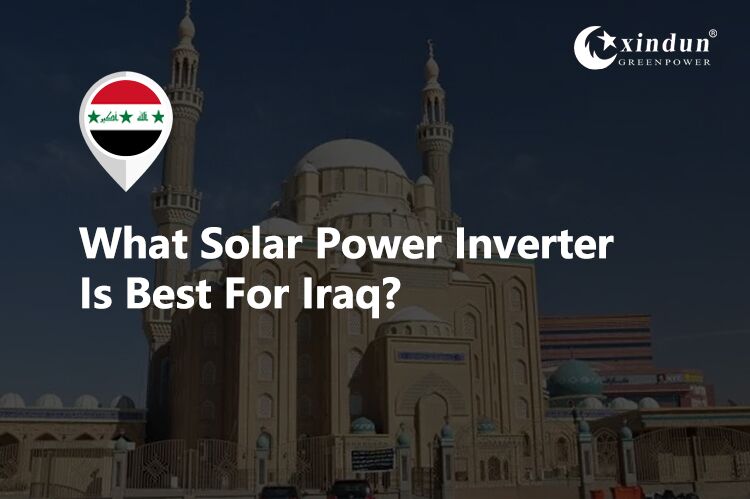
I.Power structure In Iraq
Iraq's power structure mainly relies on fossil fuels, especially natural gas and oil. About one-third of natural gas and electricity supply comes from Iran. About 90% of electricity comes from thermal power, but due to the lack of infrastructure and technical support, these power plants face problems such as unstable fuel supply and inefficiency. Iraq's power grid is also in an aging state, with serious power losses, and many areas face unstable power supply and frequent power outages. Although Iraq has abundant oil and natural gas resources, power facilities are frequently damaged due to wars, conflicts and security issues, and recovery progress is slow. The power industry has long lacked sufficient investment and technical support, making it difficult for the power supply system to meet growing demand. On November 24, 2024, the Iraqi Ministry of Electricity issued a statement saying that due to the complete interruption of Iranian natural gas supply, the power system lost up to 5,500 megawatts. The proportion of hydropower is relatively stable, maintaining at about 10%, while other energy methods account for about 7%, among which solar and wind power in renewable energy accounts for a small proportion, but is gradually increasing.
II.Current situation of power supply in Iraq
1. Insufficient power supply and serious power outages
Although Iraq is one of the countries with the richest oil reserves in the world, the nationwide power shortage problem is very serious and the power capacity is limited. The United States has terminated the sanctions exemption for Iraq to import electricity and natural gas from Iran since March 17, 2025, resulting in a 40% drop in Iraq's natural gas imports, directly causing a power gap of 10,000 megawatts. Iraq's current power supply is experiencing the "worst crisis in history". The average daily power supply time of the national power grid has dropped sharply to 2-4 hours, and the shortest power outage time interval is only 2 hours. In some areas, there is even an extreme situation of "power supply for 2 hours and power outage for 7 hours". As summer begins in April, the temperature will exceed 45℃, and the power gap may expand to 15,000 megawatts, further exacerbating the imbalance between supply and demand. Solar power has become the first choice to solve Iraq's power gap.
2. Reliance on thermal power, economic tension
Iraq's power structure mainly relies on thermal power, and about 90% of its electricity comes from natural gas and oil. Due to its limited fuel processing capacity, Iraq needs to import a large amount of natural gas and electricity from Iran to meet its needs. Due to long-term arrears of Iranian natural gas import payments, Iraq's natural gas supply has been greatly reduced, further exacerbating the power shortage problem. Many gas-fired power plants have backward technology, resulting in low energy efficiency, further exacerbating the power shortage problem. They have to turn to solar power to relieve the country's economic pressure.
3. Aging power grid and serious transmission losses
Iraq's power infrastructure has long lacked maintenance, and the transmission lines are seriously aging, resulting in a large amount of power loss during transmission. The phenomenon of power theft is relatively common in some areas, exacerbating the instability of power supply. Due to war damage and insufficient investment, many power stations and transmission and distribution networks have not been repaired in time, resulting in the inability to effectively transmit to end users even if there is a certain amount of power capacity. According to statistics from the Iraqi Ministry of Electricity, the loss rate of the national transmission and distribution network is as high as 30%-40%, which is much higher than the global average (about 8%-10%). Choosing solar inverters for power will reduce dependence on traditional power grids.
4. Reliance on diesel generators, high cost and serious pollution
Due to the unstable power supply of the power grid, many families and businesses have to rely on diesel generators as backup power sources. The high price of diesel and the high fuel consumption of generators lead to high electricity costs for users. At the same time, it causes serious air pollution and noise problems, affecting the quality of life of residents. According to the World Bank, Iraq spends billions of dollars on diesel power every year, which not only increases the economic burden on families and businesses, but also puts great pressure on the environment. Solar power can not only provide stable electricity, but also help users reduce electricity bills. At the same time, solar energy, as a clean energy, can reduce environmental pollution and promote the country's green sustainable development strategy.
5. Backward economy and slow reform
Although the Iraq government is aware of the power shortage problem and has introduced some energy investment projects, the modernization of the power industry has been slow due to tight fiscal budgets, inefficient power grid management systems and insufficient policy implementation. Domestic and foreign investors lack confidence in Iraq's energy market, which makes the pace of upgrading power infrastructure still lag behind. It is necessary to vigorously develop solar power, introduce a large amount of domestic and foreign investment, and promote national economic development.
III. The development potential of solar energy in Iraq
1. Abundant solar energy resources
Iraq is located in the Middle East and has abundant solar energy resources. The sunshine time can reach 8-10 hours a day, the average annual sunshine time can reach 3000-3650 hours, and the average annual radiation intensity is more than 2600kWh/㎡, which lays the foundation for the large-scale development of solar power. Compared with other regions that rely on traditional energy for power, Iraq can convert solar energy into electricity more efficiently, greatly reducing the levelized cost of electricity (LCOE) of solar power. According to the International Renewable Energy Agency (IRENA), Iraq's solar power potential exceeds 100,000 megawatts (MW), which is more than 5 times the current national total power capacity. It provides strong support for Iraq's solar power.
2. National policy promotion
The Iraqi government vigorously promotes the transformation of renewable energy and sustainable economic development, and has set a clear renewable energy installed capacity target. It plans to achieve an installed capacity of 12 GW by 2030, when renewable energy will account for 33% of the power structure. Iraq not only focuses on the development of centralized ground power stations, but also encourages the development of industrial and commercial solar and household solar to alleviate the power supply problems caused by weak power grids and improve the lives of residents in areas without electricity. The government has also established a $680 million renewable energy fund specifically to support the development and construction of solar energy projects. At the same time, Iraq has launched a project to install solar energy systems on 5,000 government buildings. The first phase has covered 543 buildings. This not only plays a leading role in demonstration, but will also effectively boost the domestic market demand for solar energy equipment. From 2024, solar equipment imports will be duty-free (new regulations for 2024), while foreign capital will be allowed to hold 100% of the shares of power station projects, and technical assistance agreements will be signed with the UAE and China. These policies further reduce the investment cost of solar energy projects, attract more domestic and foreign capital to influx, and promote the vigorous development of the solar energy industry.
3. Population growth, large market demand
Iraq's population is growing rapidly. The latest census shows that the total population has reached 45.4 million. The economy is also gradually recovering, and the demand for electricity continues to rise. The current electricity supply gap is huge. To achieve power balance, 54 GW of electricity is needed, while the actual power capacity is only 15 GW. Traditional energy power is constrained by factors such as unstable resource supply and aging infrastructure, and it is difficult to meet the growing demand for electricity. Solar power has become the key to alleviating power shortages with its advantages of clean, stable, and distributed layout. Whether it is urban residents improving the stability of electricity use or industrial enterprises expanding production scale, solar power can provide an effective solution. The Iraqi people have an urgent need for stable electricity, and the market demand for solar energy in civil, commercial and industrial fields will continue to grow, creating a broad market space for the development of the solar energy industry.
4. International cooperation
The Iraqi government actively seeks international cooperation in solar power projects, and has awarded centralized solar power contracts to international energy giants such as TotalEnergies of France, ACWA Power of Saudi Arabia, and Masdar of Abu Dhabi, accelerating the development of the country's solar energy industry with the help of international advanced technology and funds. This will bring advanced technology and financial support, which will help the rapid development of the local market. Some companies in developed countries have advanced solar technology, efficient inverter manufacturing technology and rich project management experience. They are eager to enter the Iraqi market and achieve mutual benefit and win-win results through cooperation in building solar power projects. By cooperating with international partners, Iraq can not only introduce advanced technology and equipment to improve its solar power efficiency and system stability, but also learn advanced project operation and management models to accelerate the modernization of the solar industry.
IV. How is the price of electricity in Iraq?
The Iraqi government provides a low official electricity price, but the country's electricity supply is severely short and the grid coverage is low. Most residents and businesses cannot get electricity from the national grid. They are forced to use private diesel generators or buy electricity from black market power suppliers, which pushes up the actual cost of electricity. Although the government sets residential electricity prices at about $0.007-0.021 per kilowatt-hour, and commercial and industrial electricity prices are no more than $0.07, most people need to buy additional high-priced electricity because the national grid cannot supply electricity 24/7. In the hot summer, electricity consumption surges, but the grid is insufficient, and many people have to rely on diesel generators. The cost of diesel power is usually as high as $0.30-0.50/kWh, which is more than 10 times the official electricity price. For some families who cannot afford to purchase generators, they can only buy electricity from private power suppliers, and the price usually ranges from $0.15-0.25/kWh. Iraq imports a large amount of electricity from Iran and Turkey every year to meet demand. The price of imported electricity is relatively high, about $0.10-0.15/kWh. Since the United States lifted the sanctions exemption for Iraq to purchase electricity from Iran, Iraq's electricity supply has been thrown into chaos and prices have fluctuated greatly. The high cost of electricity has become a heavy burden on Iraq's social and economic development. Compared with expensive diesel power, the cost of solar power is only $0.02-0.05/kWh, which is much lower than the cost of diesel power. With the active promotion of the government, many households have installed rooftop solar + energy storage systems to achieve solar power during the day and energy storage power supply at night, reducing their dependence on traditional power grids and private power suppliers and reducing electricity bills. Enterprises also reduce operating costs by generating electricity through solar systems. As more and more households and businesses use solar energy, Iraq's solar market is developing rapidly and is expected to break the current power dilemma.
V. What solar inverter is suitable for Iraq?
In Iraq's solar power system, the inverter, as the core equipment, undertakes the key task of converting the direct current (DC) generated by the battery and solar panels into usable alternating current (AC). Due to the unstable power supply in Iraq, the serious aging of the power grid, and even no electricity available in some areas, choosing the right type of inverter is crucial to improving the efficiency and reliability of the solar system. We will analyze the applicability of off-grid inverters, on grid inverters and hybrid inverters in combination with Iraq's power status.
Off-grid inverter
Off-grid inverters are mainly used for independent solar power generation systems. It mainly converts the direct current(DC) generated by solar panels into alternating current(AC) through the inverter, directly supplies it to the load, and stores it in the battery for use at night or on cloudy days. The system is not affected by grid fluctuations. In many rural areas of Iraq, the grid coverage is insufficient, and there are frequent power outages for a long time, or even no electricity available. Off-grid inverters can ensure that these areas are self-sufficient in electricity. Compared with diesel generators, solar inverter systems are easy to install and maintain, with low noise, improved environmental pollution, and low power costs, which can bring long-term economic benefits. For users who rely heavily on diesel generators, it can significantly reduce fuel costs while reducing noise and pollution. In addition, Iraq's solar energy resources are widely distributed and inexhaustible. In remote areas, solar energy can be fully obtained without relying on complex and unstable grid infrastructure to transmit electricity, truly realizing the local acquisition and utilization of solar energy. Off-grid inverters are more suitable for remote rural areas, off-grid facilities, post-disaster reconstruction, and areas lacking grid infrastructure. It can not only provide a stable and reliable power supply, but also significantly reduce users' energy costs while reducing environmental pollution.
Hybrid inverters
Hybrid inverters have the functions of both off-grid inverters and on grid inverters, and are an ideal choice for dealing with Iraq's complex power environment. When there is sufficient sunshine during the day, the hybrid inverter can intelligently give priority to solar power supply. On the one hand, it can meet the current electricity demand of households or enterprises, reduce dependence on the power grid, and achieve efficient use of energy; on the other hand, when the solar power exceeds the real-time electricity demand, the excess power can be stored in the battery for emergency use. For example, in some small factories located in the suburbs, the factory operation power consumption is large during the day. The hybrid inverter can use solar power supply and store the excess power, which reduces the factory operation cost.
At night or when there is a power outage, the system will automatically switch to battery power supply mode to ensure that the normal power consumption of households and enterprises is not affected. For households with high electricity demand, when the power grid is out of power, the hybrid inverter can promptly enable the battery reserve power to ensure the normal operation of lighting, home appliances and other equipment, and maintain the orderly progress of family life.
The inverter can be switched intelligently according to user needs. The power grid in Iraq is unstable, and the hybrid inverter has become the most flexible and practical choice. Whether in remote areas affected by power grid fluctuations or facing long power outages, hybrid inverters can provide users with reliable power support under different power supply conditions, effectively cope with Iraq's complex and changeable power supply conditions, reduce power costs, and improve the stability and reliability of power supply.
On grid inverters
On grid inverters are used to convert the direct current(DC) generated by solar panels into alternating current(AC) and directly connect(DC) to the public power grid to achieve seamless integration of electric energy. Suitable for areas with stable power grids and on grid policy support, it allows users to feed excess power back to the grid while meeting their own power needs. Iraq is currently facing a serious power shortage, insufficient power supply capacity of the power grid, and frequent power outages. In this environment, the application of on grid inverters is limited by the reliability of the power grid. Once the power grid is disconnected, the on grid inverter cannot operate independently, and users will still face power outages. Therefore, for areas with unstable power grids, frequent power outages or no power grid coverage, off-grid inverters and hybrid inverters can reduce dependence on traditional power grids and provide stable power supply.
VI. Recommended solar inverters in Iraq
Iraq has suffered from war damage and has long faced power shortages and instability. For post-disaster reconstruction, solar power systems have become an important choice to solve Iraq's power problems. Choosing a suitable solar inverter is crucial, which can not only improve energy efficiency, but also effectively reduce electricity costs. As a leading global solar inverter manufacturer, Xindun's off-grid inverters are very popular in the Iraqi market. Not only can it cope with Iraq's harsh environment such as high temperature and dust, but it can also meet the needs of different users. Below, Xindun recommends several of the most popular solar inverters in the Iraqi market.
1. Xindun HFP On-Grid And Off-Grid Hybrid Solar Inverter
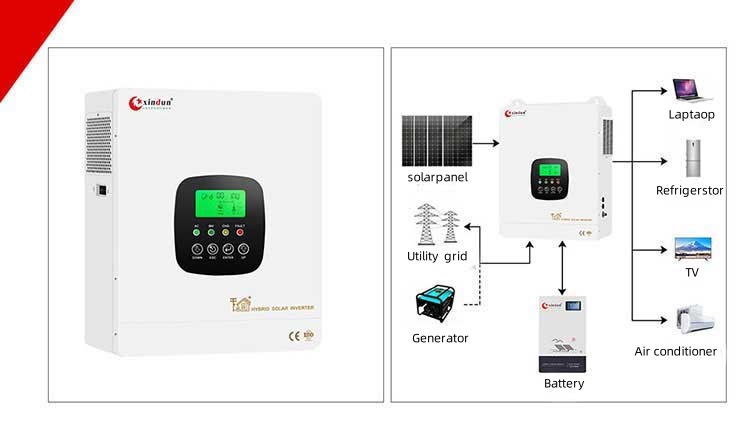
Xindun HFP on off grid hybrid solar energy inverter provide DC 12/24/48V to AC 220/230/240V, rated power from 1300W, 1800W, 2300W, 3300W, 4300W, 6300W, 8300W, 10.3KW, 12.3KW
The HFP on-grid and off-grid hybrid solar inverter has the following features:
1. It has a bidirectional energy storage management function, which enables both solar and mains power to charge the battery. Users can flexibly store solar power and use it when the mains power is off, reducing dependence on expensive fuel generators.
2. The inverter adopts high-frequency technology, which is small in size, high in power density, and high in overall conversion efficiency. In the environment of tight electricity demand in Iraq, users can make better use of limited space and energy and improve the overall output capacity of the system.
3. It has an ultra-wide max power point tracking (MPPT) range, works efficiently under different lighting conditions, and maximizes the use of Iraq's abundant solar energy resources. Ensure that the solar energy system operates around the clock and increase power.
4. It outputs high-quality pure sine wave current, which is suitable for various precision equipment, such as household appliances, medical equipment, industrial production equipment, etc. In the environment of large power fluctuations in Iraq, it can provide a stable power supply and protect electronic equipment from damage.
5. It has on-grid mode, off-grid mode, and hybrid mode. In hybrid mode, the inverter gives priority to solar power supply. When solar power is insufficient, the mains power is used to compensate. The load is powered by both solar power and the mains power. Excess power can be stored in the energy storage battery.
6. Supports adjustment of charging current according to battery capacity. Whether it is a small home system or a large commercial energy storage system, it can be flexibly adapted to ensure that the battery will not be damaged by overcharging or over-discharging, and improve the reliability of the overall system.
7. Supports communication with the lithium battery BMS system to achieve precise battery management and safety protection, and provide a more reliable energy storage solution in the high temperature environment of Iraq.
8. The inverter also supports setting output priority (solar priority or mains priority) and charging priority (battery priority or mains priority), helping users to better manage energy and give priority to the use of stored power during power outages.
9. Supports battery-free operation to reduce initial investment costs.
10. Supports RS485 communication and mobile phone APP monitoring (WIFI/GPRS). Users can remotely view the system operation status and monitor power usage in real time. This is crucial for areas in Iraq where electricity resources are scarce, and can help users optimize energy management and ensure that the system always operates efficiently.
Xindun HFP-C On-Grid and Off-Grid Hybrid Solar Inverter
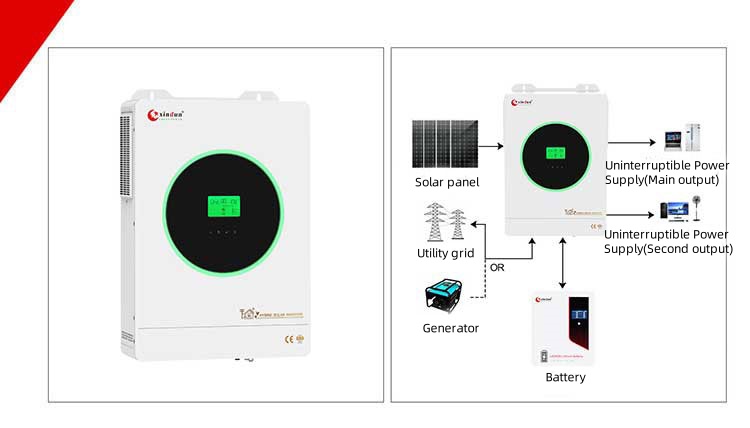
Xindun HFP-C On-Grid and Off-Grid Hybrid Solar Inverter DC 24V/48V to AC 220V/230V/240V, rated power 4300W, 6300W, 8300W, 10.3KW, 12.3KW
The HFP-C on-grid and off-grid hybrid solar inverter has the following features:
1. Equipped with customizable RGB LED lights to increase the visual experience and make the device operation status more intuitive, suitable for home, commercial and industrial scenarios.
2. With dual AC output, it can manage critical loads and ordinary loads separately. In the case of unstable power supply in Iraq, it ensures that key equipment (such as lighting and communication equipment) are given priority power supply and improves energy utilization efficiency.
3. Supports free setting of three modes: on-grid, off-grid and hybrid. Users can switch freely according to the power supply situation in Iraq to ensure that normal power consumption can be maintained when the power grid is unstable or outages occur.
4. Adopting high-frequency inverter technology, it has higher power density, smaller size, higher conversion efficiency, reduced energy loss, more stable operation in high temperature environment in Iraq, and easy installation and transportation.
5. Supports working without batteries, which is suitable for some users in Iraq to first establish a solar energy system, and then gradually add energy storage batteries to reduce the initial investment pressure.
6. The MPPT voltage range is wide (minimum 40Vdc/80Vdc), maximizing the use of Iraqi solar power and improving power efficiency
7. It has two-way power flow control, supports solar energy and city power to charge the battery, solar energy charging during the day, battery power supply at night or during power outages, reducing dependence on expensive diesel generators and reducing electricity costs.
8.It has BMS communication function, intelligent matching with lithium batteries, avoiding overcharging and over-discharging, extending battery life and reducing maintenance costs.
Xindun HP PLUS+ Parallel Hybrid Solar Inverter
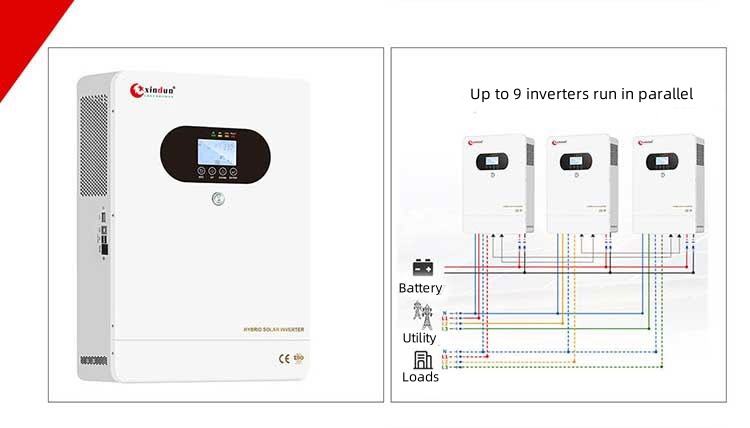
Xindun HP PLUS+ Parallel Hybrid Solar Inverter provides DC 48V to AC 208V/220/230/240V, with rated power of 5KW, 8KW, 10KW, 12KW
HP PLUS+ Parallel Hybrid Solar Inverter has the following features:
1. Supports parallel operation, 5KW supports up to 9 inverters in parallel, with an overall power of up to 45kW; 8KW, 10KW and 12KW support up to 6 inverters in parallel, with an overall power of up to 48KW, 60kW, 72kW. It also supports single-phase or three-phase output, suitable for factories, commercial places and large household users, meeting the power demand of high-load equipment in Iraq.
2. Adopting high-frequency design, high conversion efficiency and low no-load loss, it can maximize the use of solar energy and improve the overall efficiency of the system in the environment of power shortage in Iraq.
3. Support battery-free operation. When not paralleled, it can directly use solar power supply, and can power the load without batteries, reducing the initial system investment cost.
4. Built-in MPPT solar controller, up to 500V solar input voltage, suitable for long-term standby needs in Iraq's frequent power outages, improve solar power efficiency, and ensure stable power supply around the clock.
5. Support RS232, USB communication and mobile phone APP (optional WIFI module), users can remotely monitor the inverter operation status at any time and optimize power use.
6.With multiple perfect protection functions such as overload, overtemperature, short circuit, etc., it can effectively avoid equipment damage, improve system stability and extend service life when the voltage of the Iraqi power grid fluctuates greatly.
Xindun HDSX Three Phase Solar Inverter
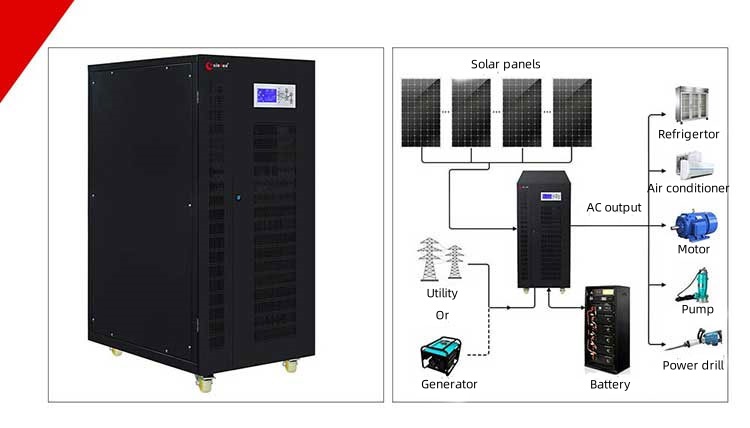
Xindun HDSX three-phase solar inverter provides DC 48/96/192/384 to AC 380/400V, with rated power of 3.2KW, 4.8KW, 5.6KW, 6.4KW, 8KW, 10KW, 12KW, 16KW, 20KW, 24KW, 32KW, 40KW, 48KW, 64KW, 80KW, 96KW, 100KW, 120KW, 128KW, 150KW, 160KW
HDSX three-phase solar inverter has the following features:
1. Equipped with RS485 communication interface and mobile phone APP (WIFI/GPRS) remote monitoring function, users can check the system operation status at any time and realize remote operation and maintenance.
2.Supports single-phase voltage and three-phase voltage output, compatible with a variety of battery types, supports low-voltage operation mode, allowing users to flexibly choose energy storage solutions according to actual conditions, and can meet the different electricity needs of industrial, commercial and household users.
3.With 0-45A main charging current adjustment function, users can flexibly adjust the charging current according to the battery type and capacity, extend battery life and improve energy utilization.
4.Built-in maximum power point tracking MPPT solar controller (optional), automatically optimizes the working state of solar panels, and improves the power efficiency of photovoltaic systems. In Iraq, solar energy can be maximized and electricity costs can be reduced.
5.With an ultra-wide input voltage range, it can still operate stably in the case of severe grid fluctuations or unstable power supply quality. In the case of large voltage fluctuations in the Iraqi grid, it can ensure continuous power supply to the equipment and reduce equipment damage caused by voltage fluctuations.
6.Supports three-phase unbalanced loads, withstands high-power triple peak instantaneous impacts, and ensures that the system can still operate stably when high-power equipment such as air conditioners and refrigerators are started. This is especially important in the face of a surge in electricity load during hot weather in Iraq, as it effectively prevents system crashes caused by excessive equipment startup power.
Xindun ESS-Li All In One Solar Power Generator
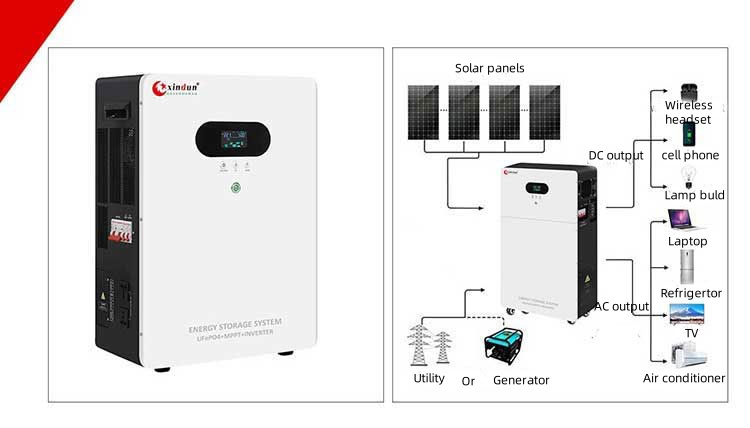
Xindun ESS-Li all in one solar power generator provides DC 12.8/25.6/51.2V to AC 110V/120V/220V/230V/240V, DC5V/12V, rated power of 300W, 600W, 1200W, 3000W, 5000W, 6000W, 7000W
ESS-Li all in one solar power generator has the following features:
1. It adopts an integrated design, integrating the solar controller, inverter and lithium battery into one, which is easy to install and suitable for remote areas in Iraq where there is a lack of professional electricians. It also reduces maintenance requirements and improves system reliability.
2. Equipped with lithium battery BMS intelligent management function, it can intelligently control battery charging and discharging, avoid overcharging and over-discharging, increase battery life, reduce replacement costs, ensure stable operation in high temperature environments in Iraq, and ensure long-term power supply.
3. Support multiple charging methods, compatible with solar energy, power grid and gasoline/diesel generator charging. In the case of unstable power grid or complete power outage in Iraq, the battery can still be charged through solar energy or generator to provide reliable backup power.
4. Diversified output interface, the device provides USB (DC 5V), DC 12V, AC socket and AC terminal output, suitable for mobile phones, lighting, electrical appliances and industrial equipment, etc., and can flexibly adapt to the diverse power needs of Iraqi families, shops and small factories.
5.Support Wi-Fi and mobile phone APP communication, users can monitor the system operation status at any time to achieve efficient and unified intelligent management.
VII. A trustworthy inverter manufacturer - Xindun Power
As one of the important economies in the Middle East, Iraq has seen a continuous increase in electricity demand in recent years. Iraq's demand for solar energy systems is increasing, and inverters, as the core equipment of solar systems, are rapidly expanding in market demand. As the world's leading solar inverter manufacturer, Xindun Power plays an important role in the Iraq market.
Since our establishment in 2006, Xindun Power has been focusing on the research and development, production and sales of core products such as off-grid inverters, solar controllers and batteries. The modern factory covers an area of more than 10,000 square meters and is equipped with a research and development team of more than 30 professional elites to innovate technologies and products to meet the diverse needs of customers.
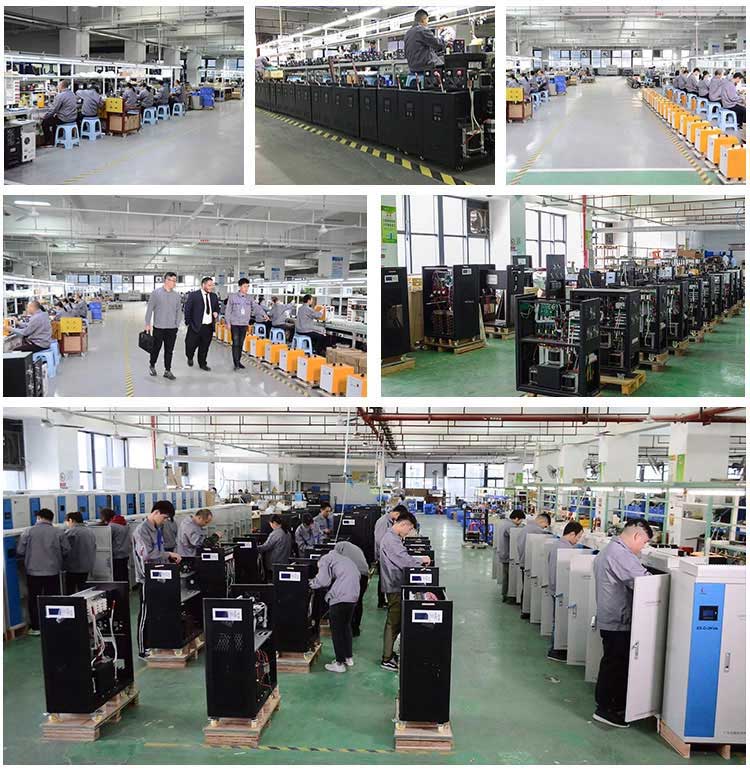
We have been deeply involved in the Iraq solar energy market for many years and have established a team stationed in Iraq for a long time. We conduct field surveys on the local power situation, provide feedback to our R&D department, and innovate and develop inverters that meet Iraq's power needs. We also regularly visit local distributors, wholesalers, engineering companies, etc., maintain long-term cooperative relations with them, and ensure that our products and solutions truly meet the needs of the Iraq market. Xindun actively participates in large-scale solar energy and power exhibitions held in Iraq every year. Through the exhibition, we display our solar energy system products that meet Iraq's latest developments and share advanced production technologies. We have occupied an important market position in the Iraq market. Our inverters are not only popular in the local market, but also sold well in neighboring countries such as Iran, Syria, and Lebanon. In just three months in 2025, more than 6,000 inverters have been exported to the Iraq market, which are widely used in household electricity, commercial power supply and government projects. We export more than 20 containers of solar products, including inverters, batteries and solar controllers, to Iraq every year. Market demand has surged in cities such as Baghdad, Basra, Mosul, and Erbil. Choose Xindun as your supplier and continue to grow your market strength.
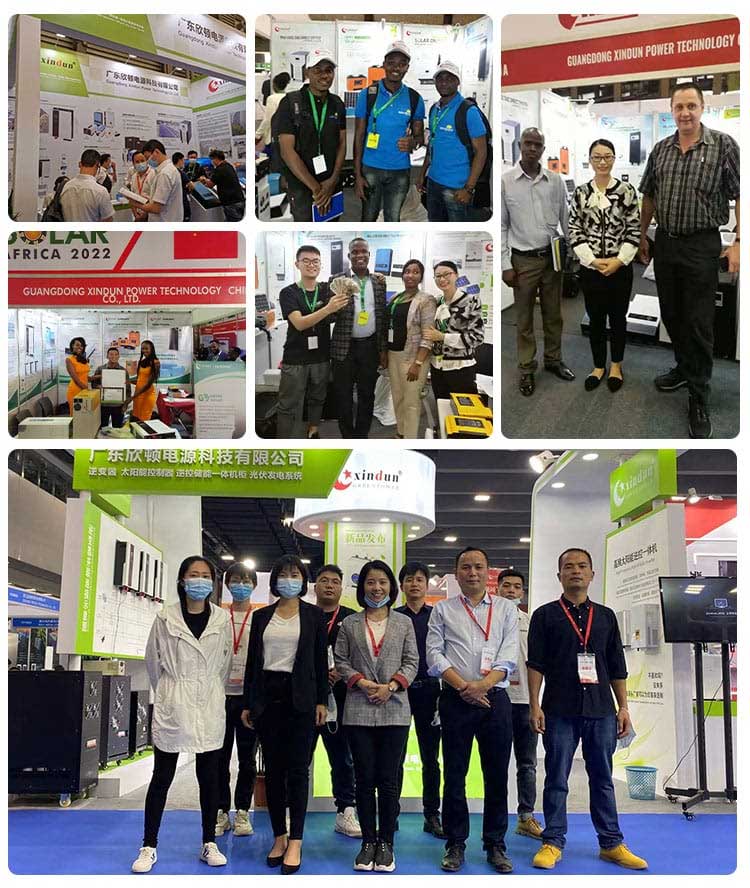
Xindun's products have been exported to more than 100 countries around the world and are widely used in Iraq's homes, government agencies, commercial and industrial projects and other fields, accumulating a wealth of successful cases. It has passed international certifications such as CE, IEC, TLC, etc., and meets global quality standards. Iraq's power situation is complex, and the power grid conditions and power consumption environments in different regions are different. Xindun can provide OEM/ODM customization services based on special power environments, and flexibly customize product parameters, appearance design and logos to meet Iraq's diverse market needs.
As a professional inverter manufacturer, Xindun Power's inverters are efficient, stable and durable, and can adapt to various solar power needs in Iraq. If you want to learn more about our product information or have inverter procurement needs, please feel free to leave a message through the Xindun Power official website window (https://www.xinduninverter.com). Our professional team will be online at any time to tailor high quality solar solutions for you.

 Solar Inverter
Solar Inverter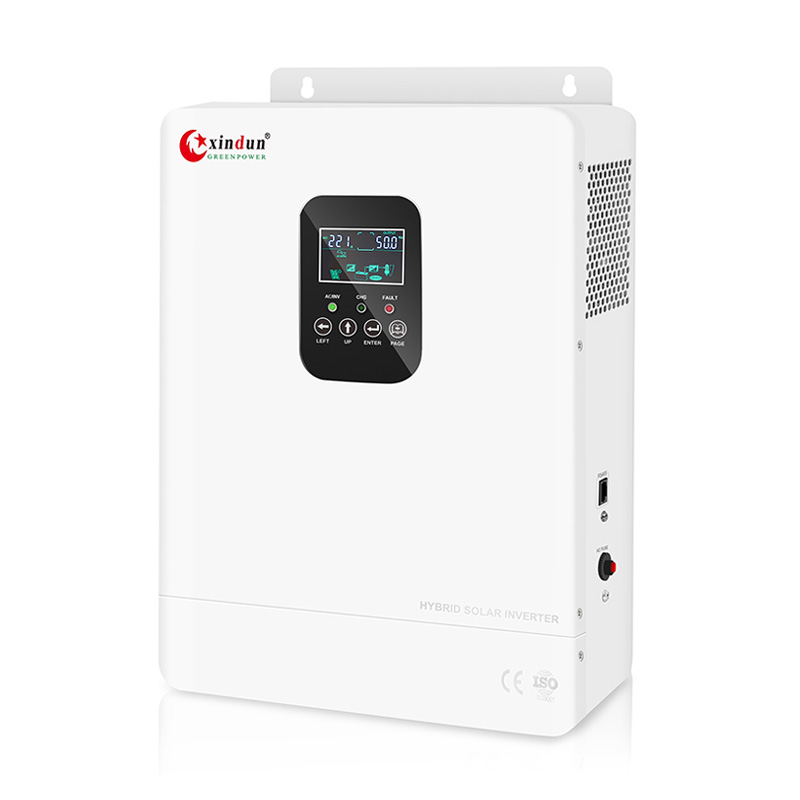
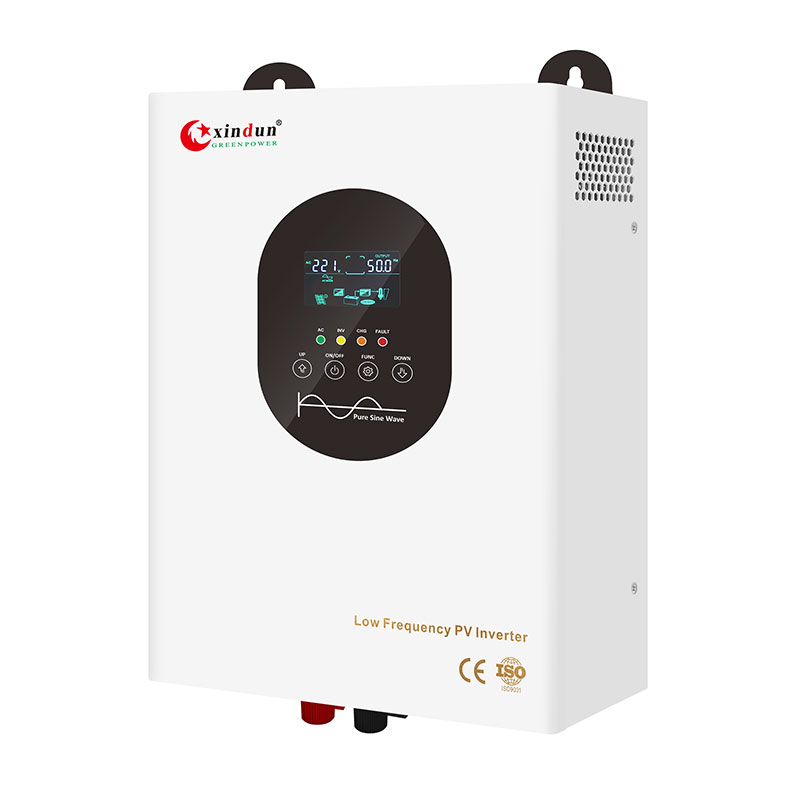
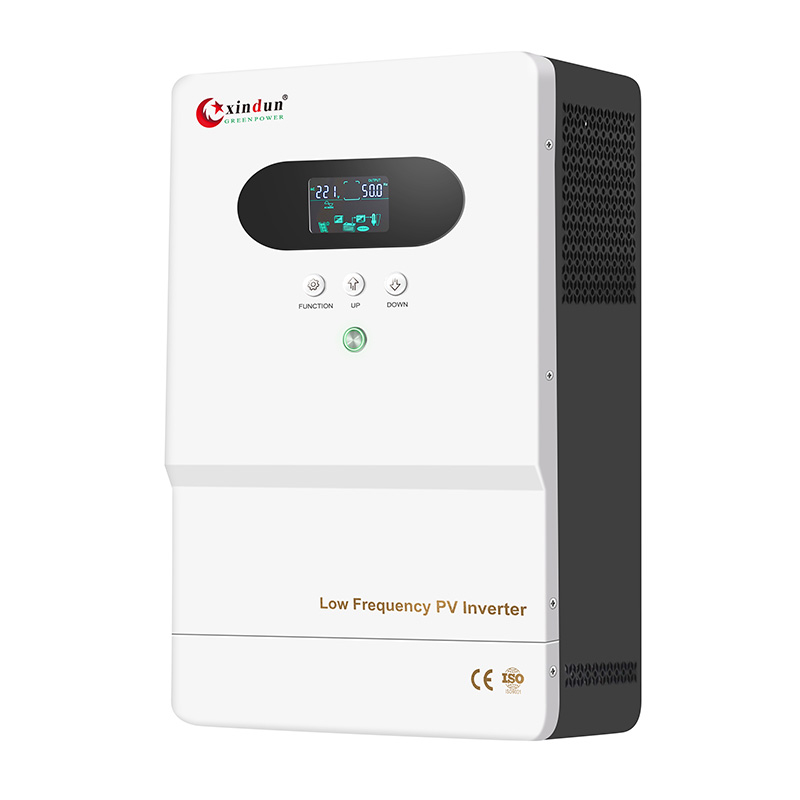
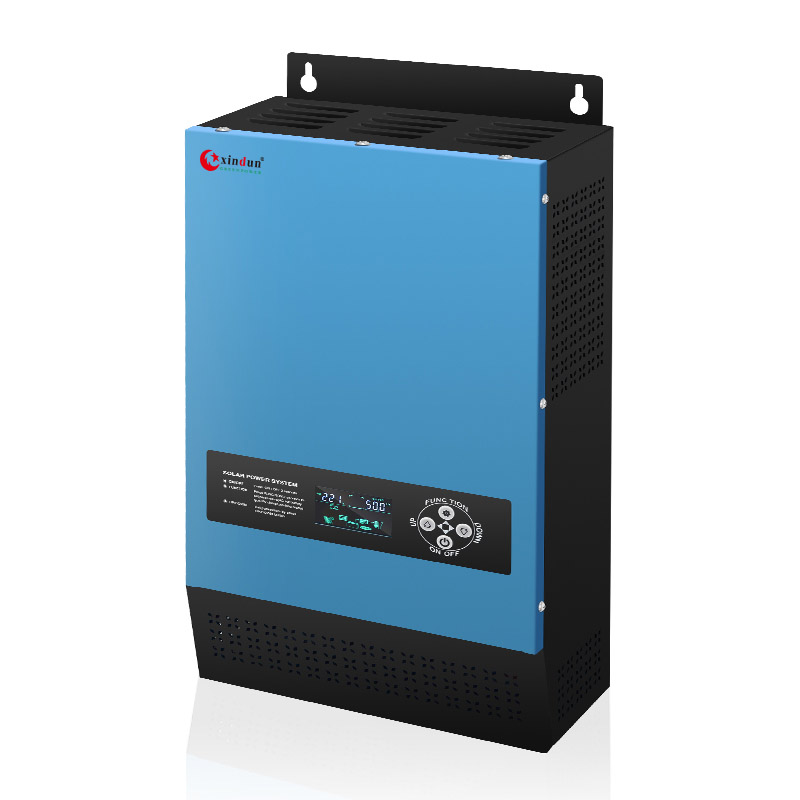
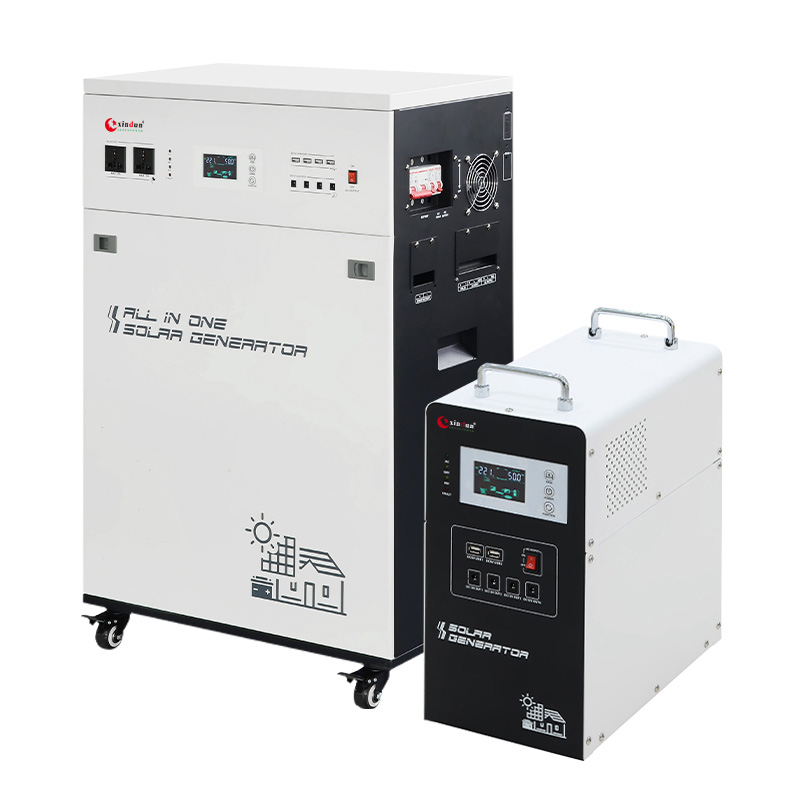
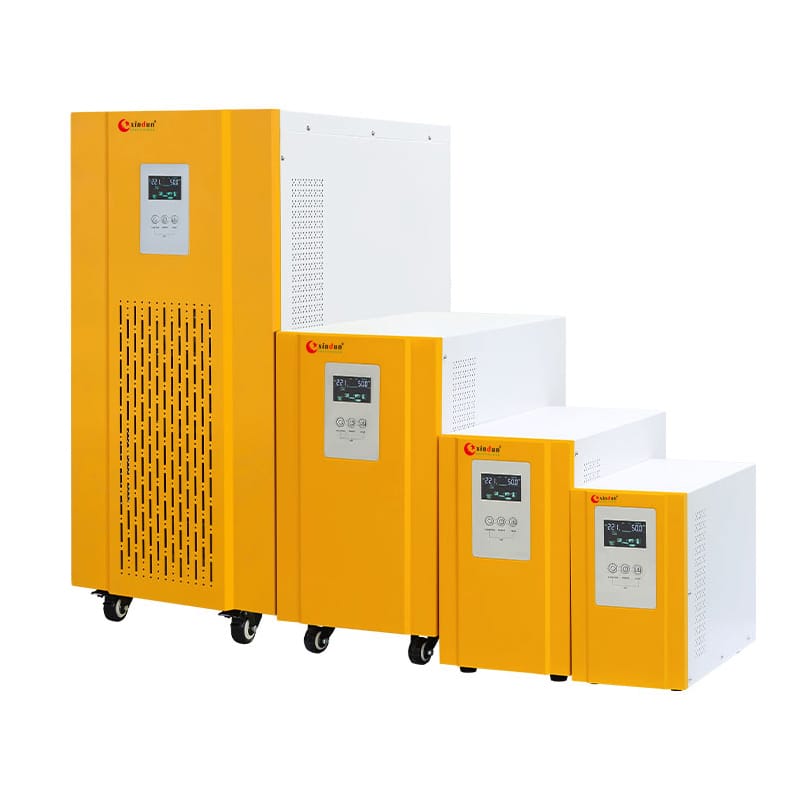
 Hybrid Inverter
Hybrid Inverter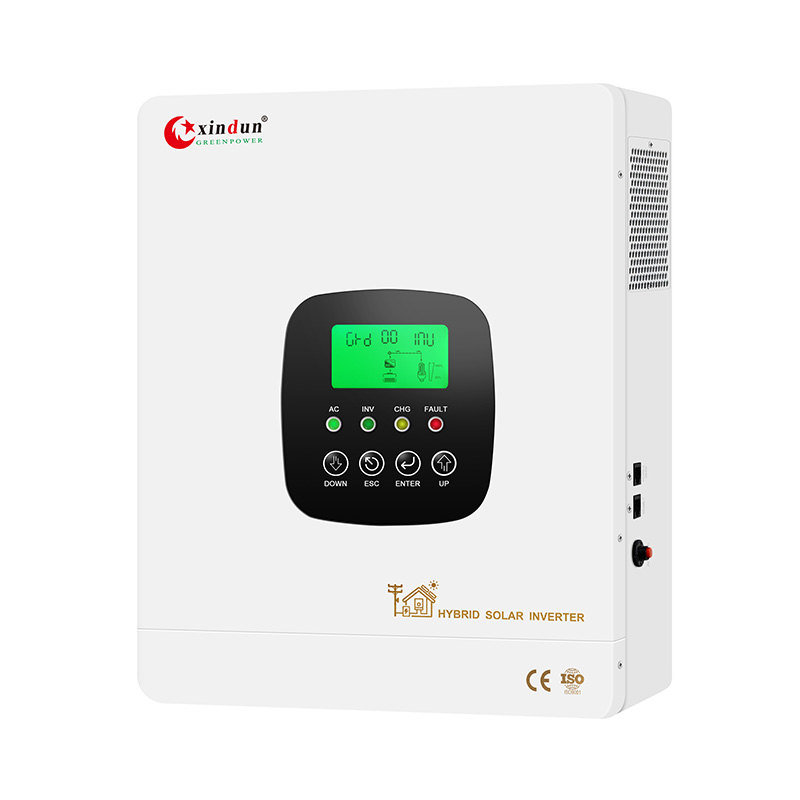
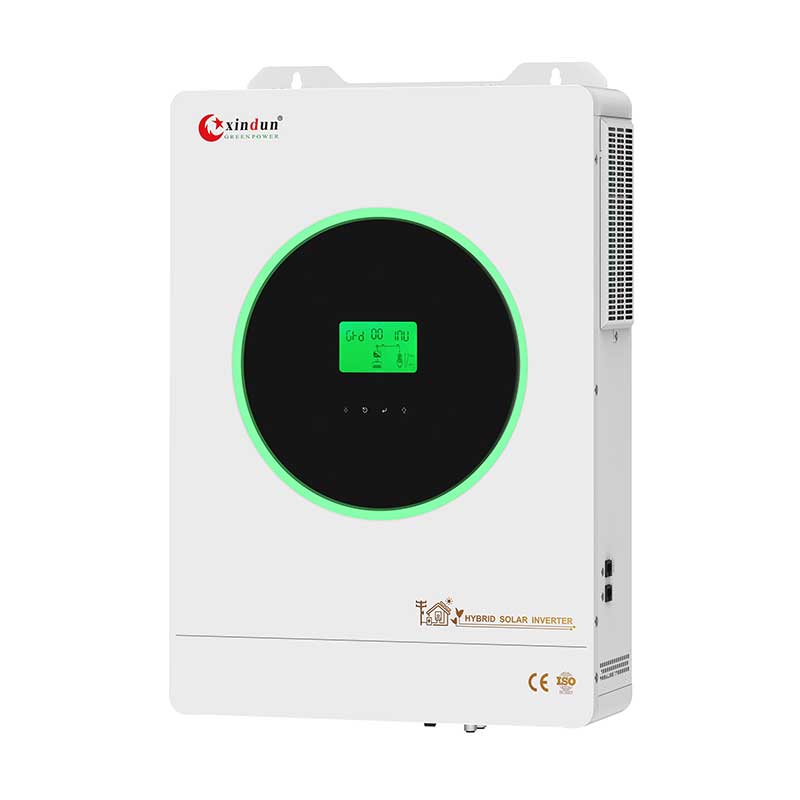
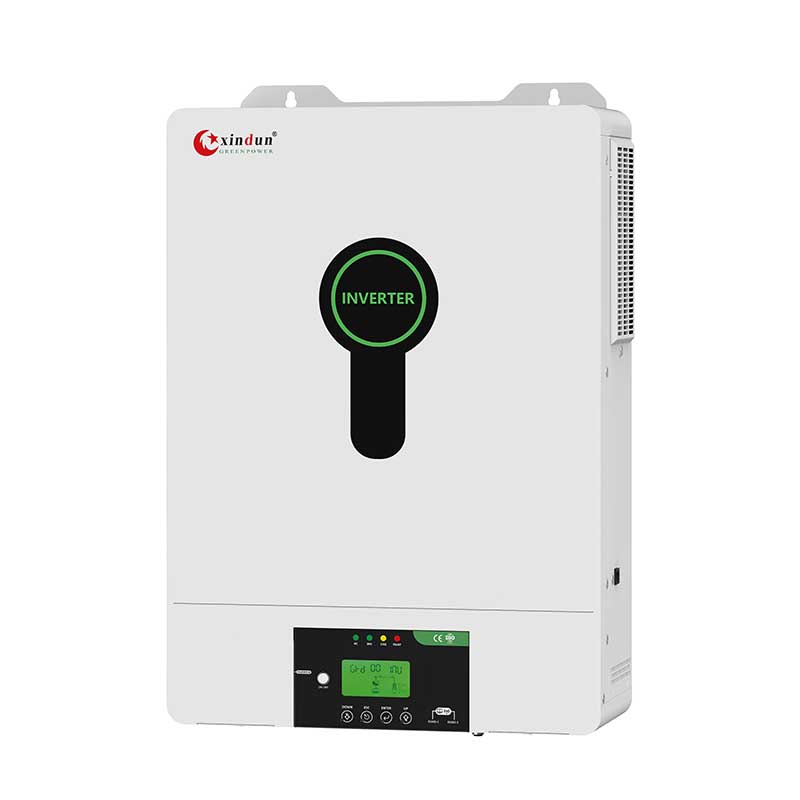
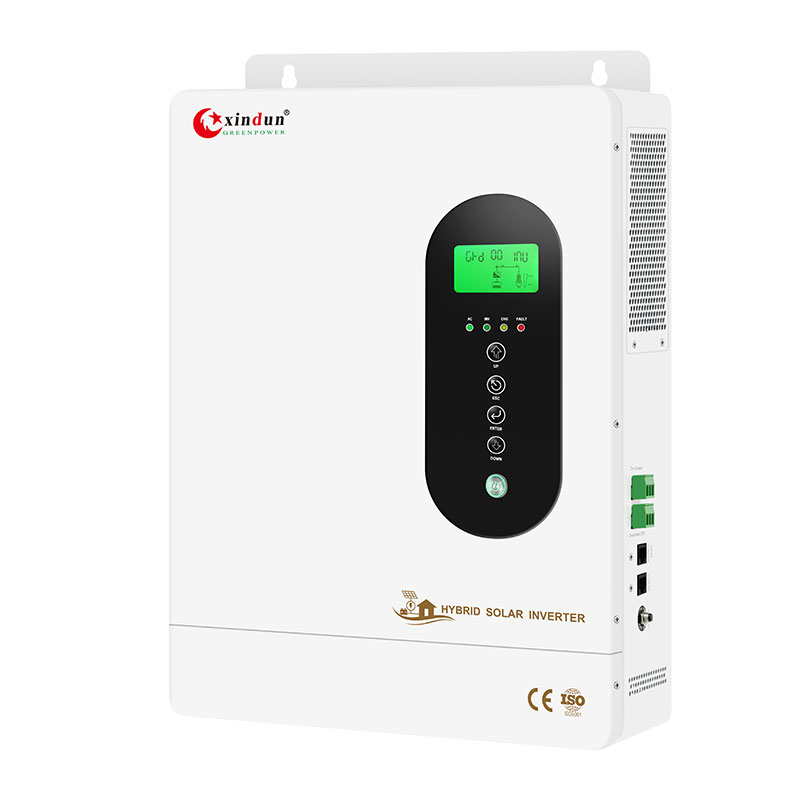
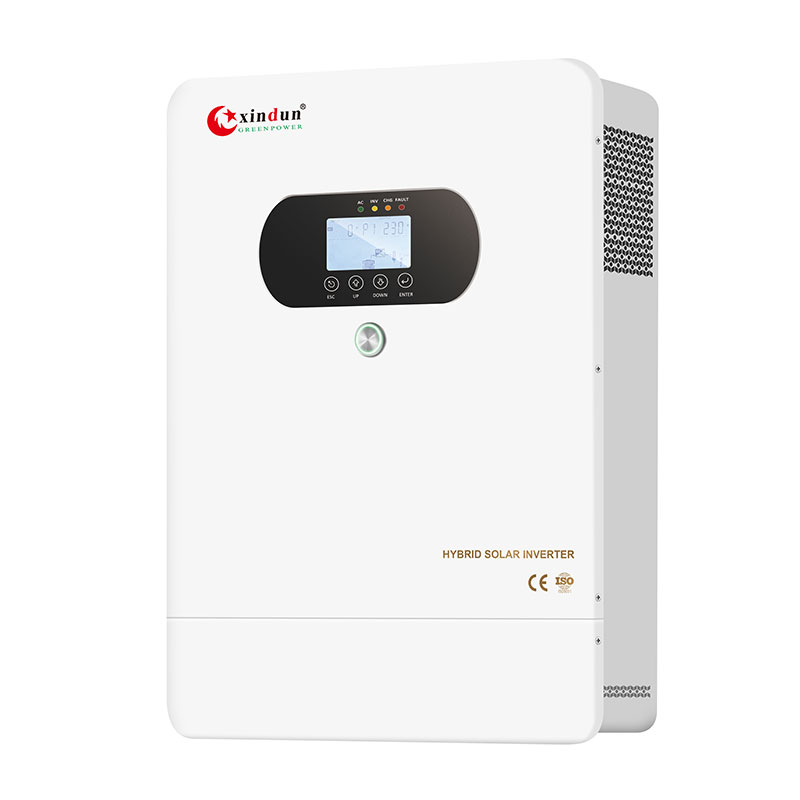
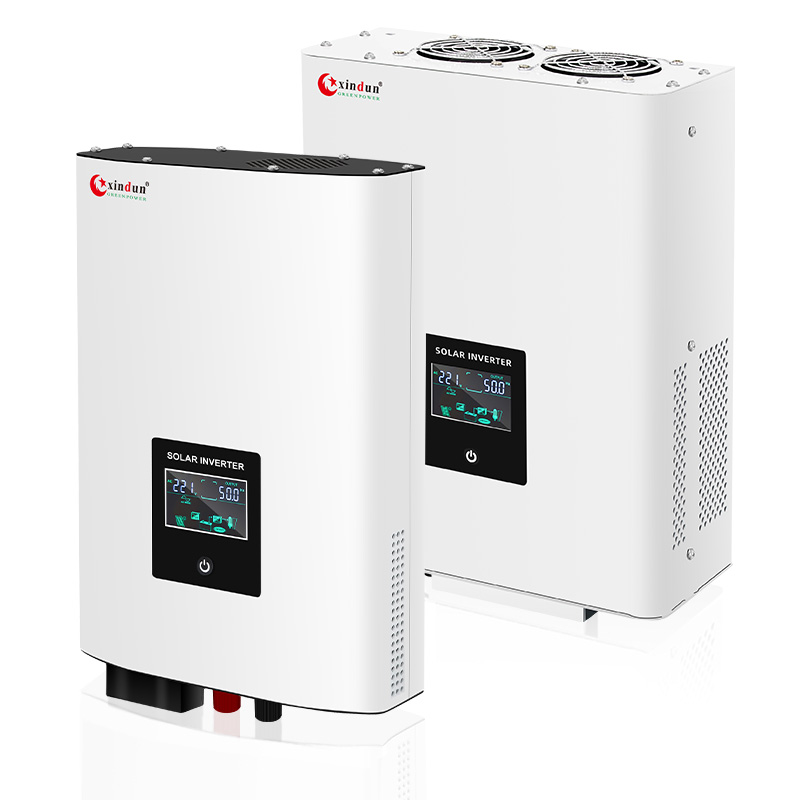
 Power Inverter
Power Inverter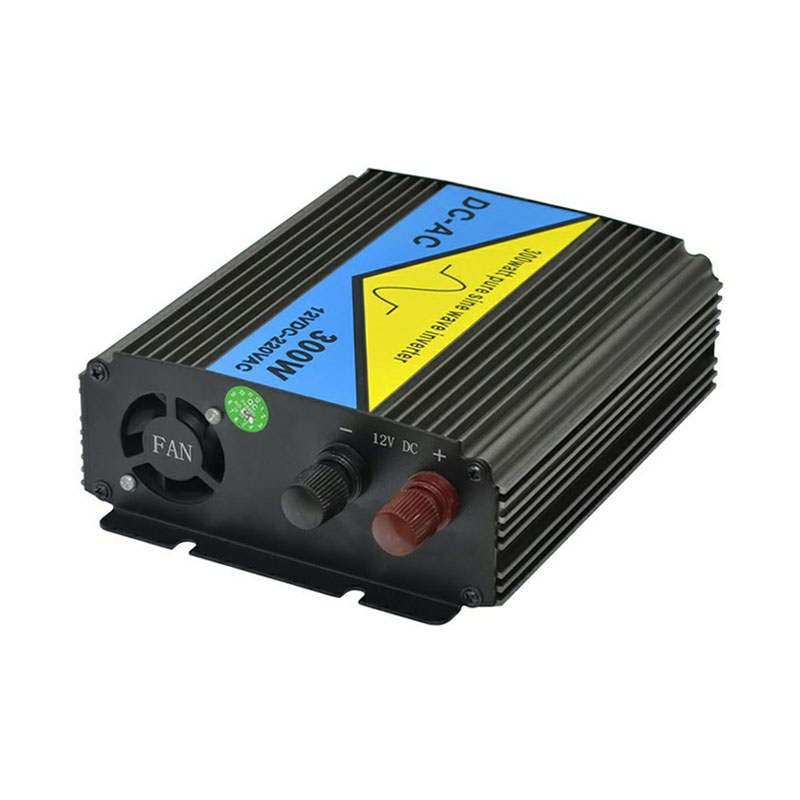
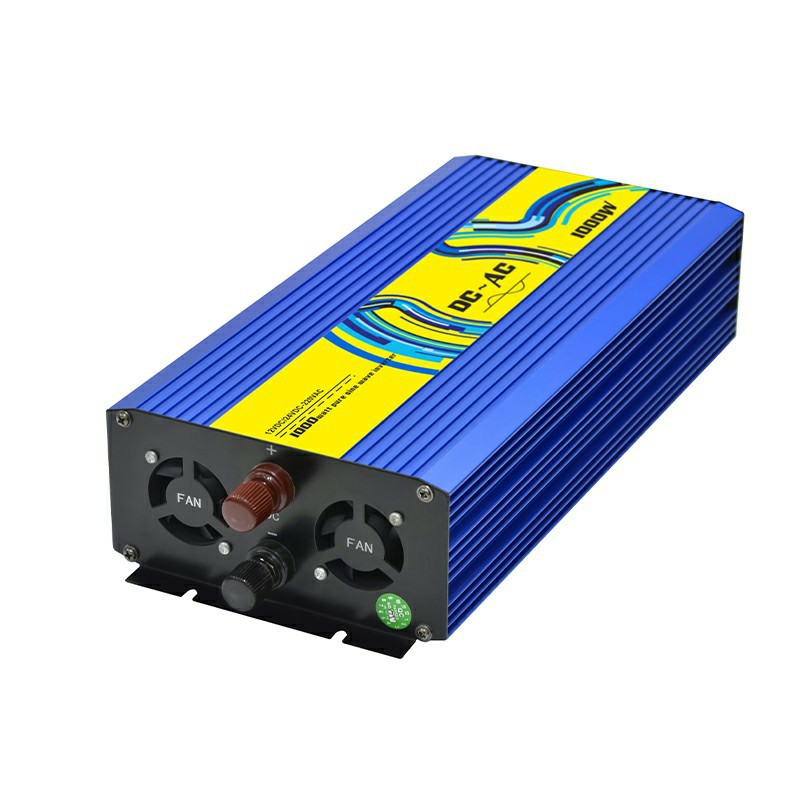
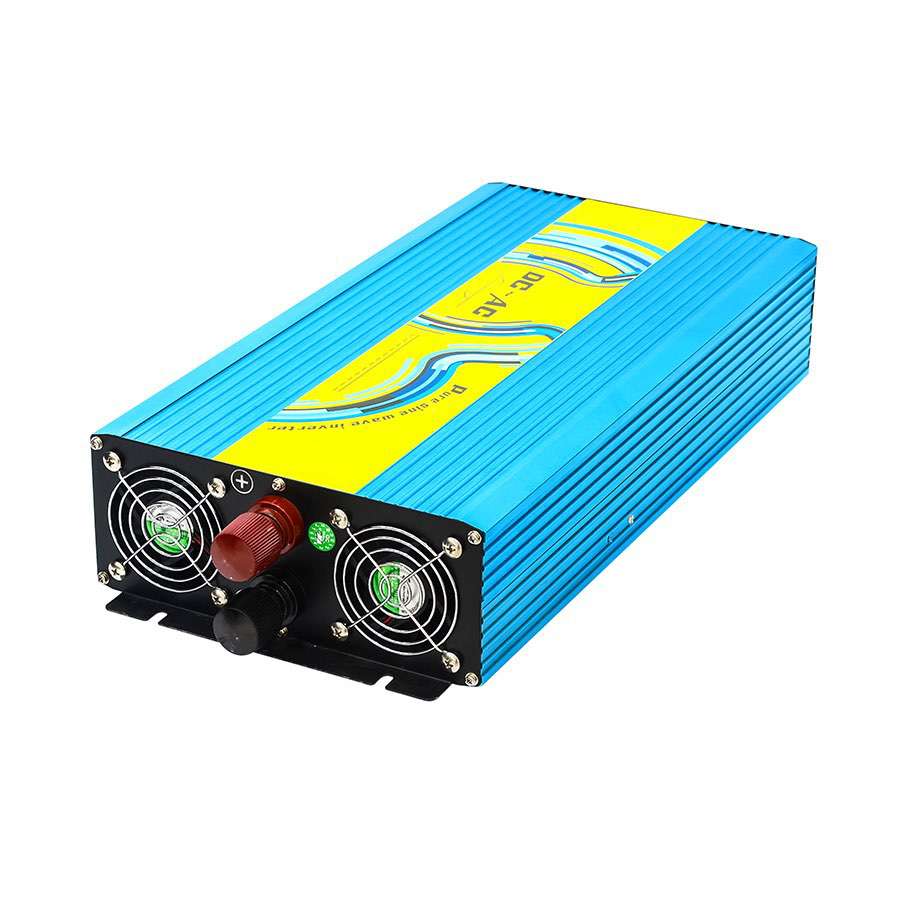
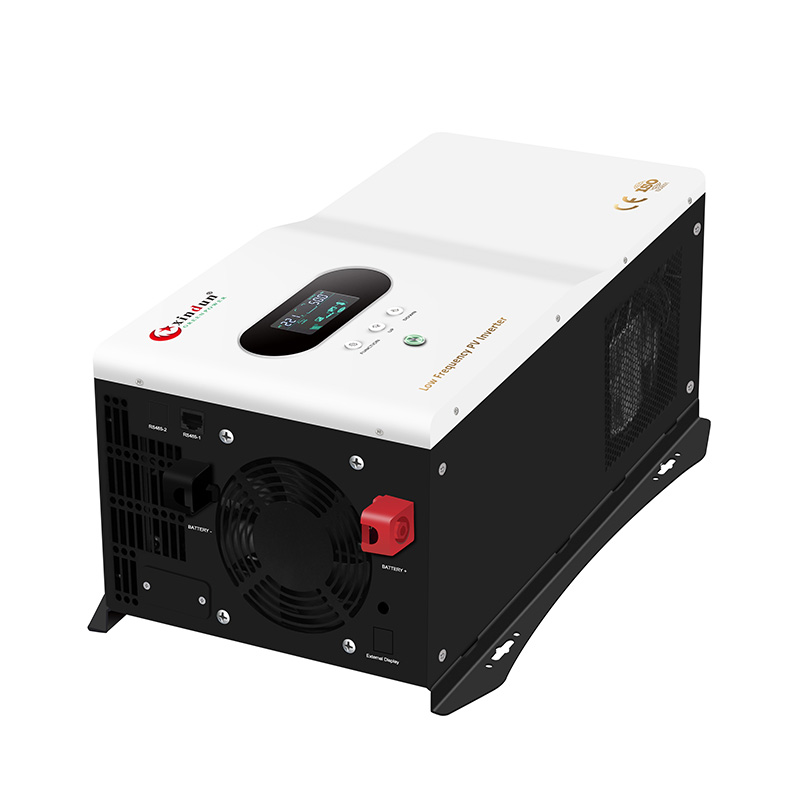
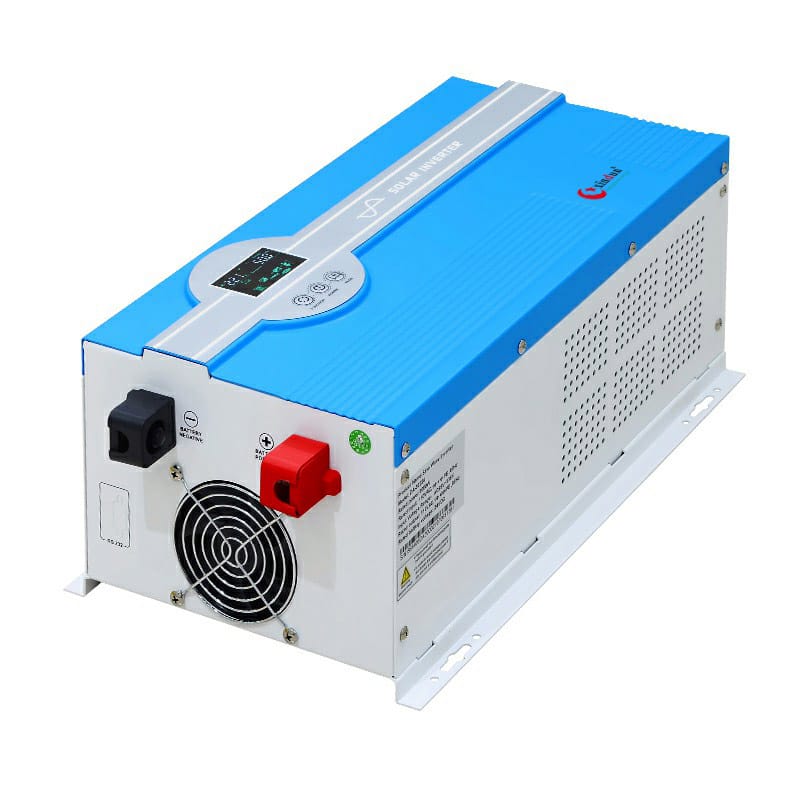
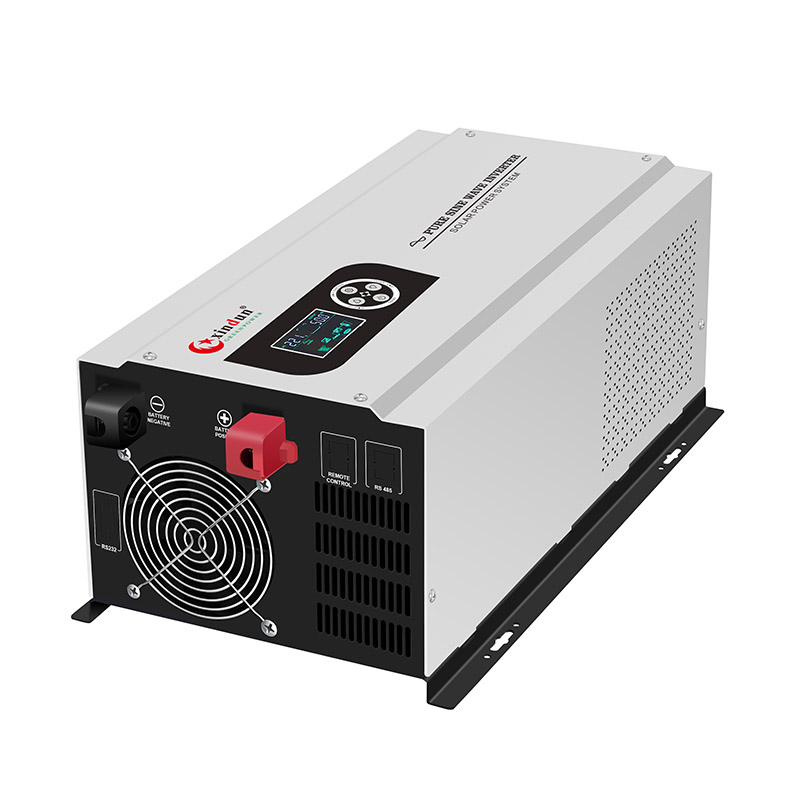
 Split Phase Inverter
Split Phase Inverter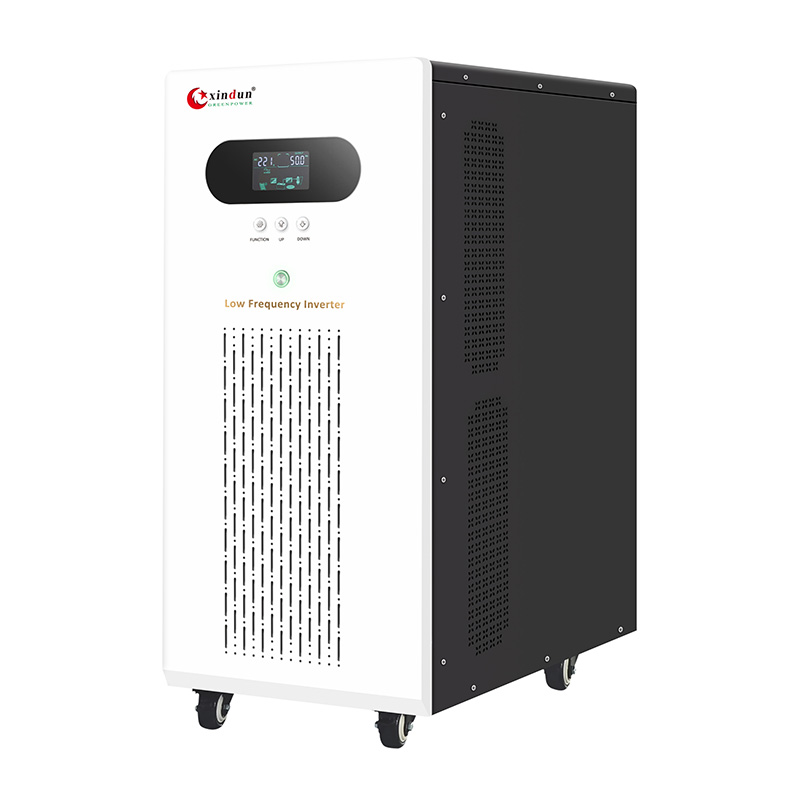
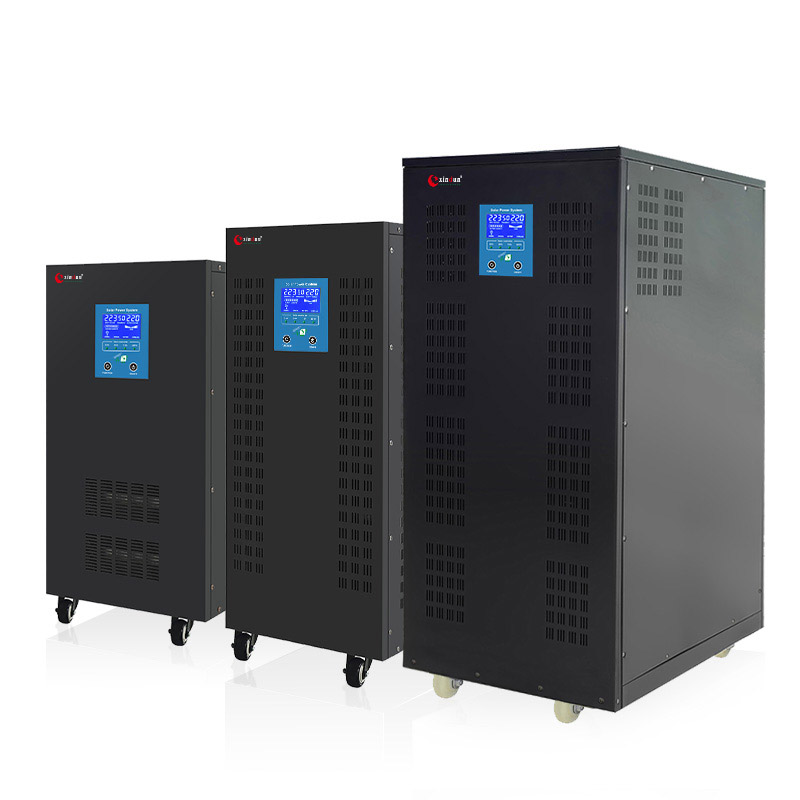
 Energy Storage Inverter
Energy Storage Inverter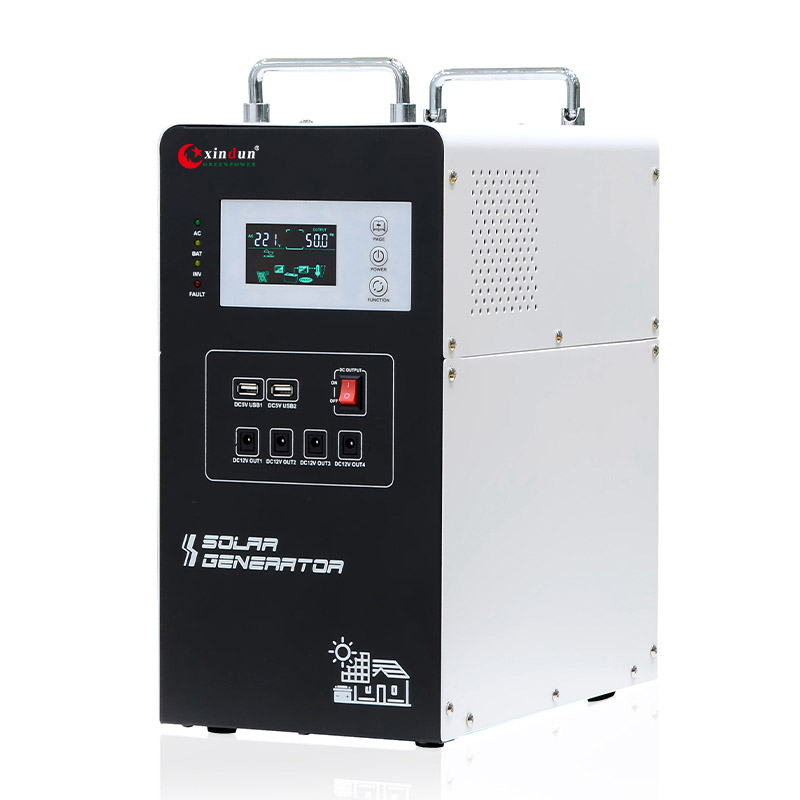
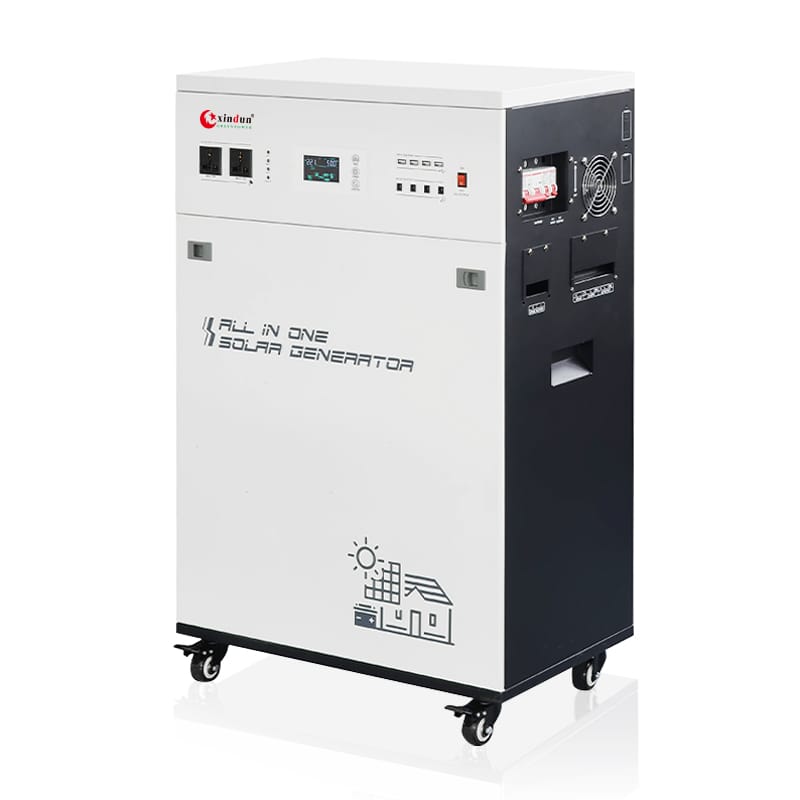

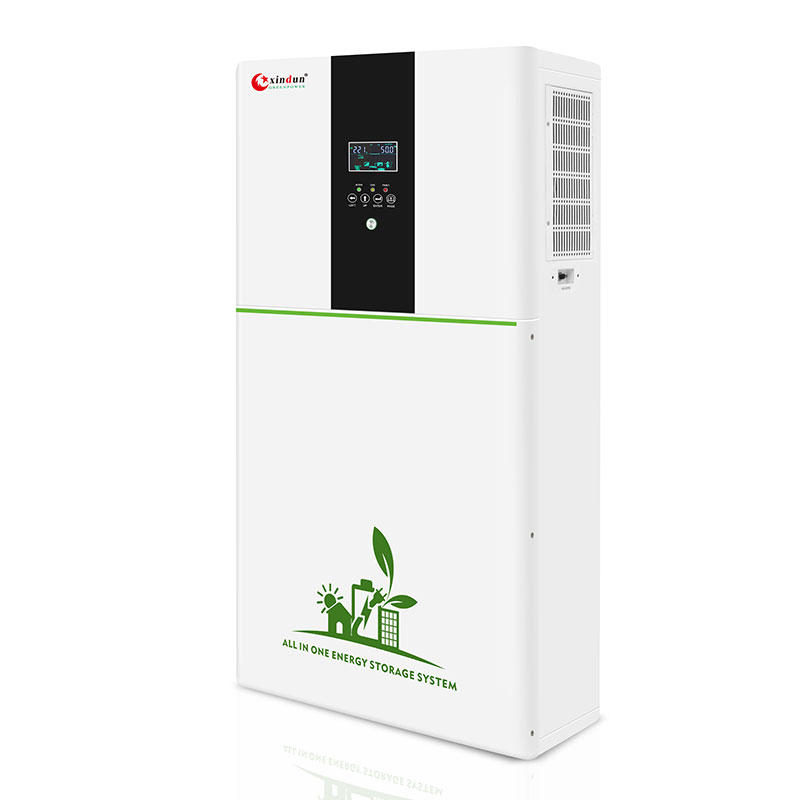
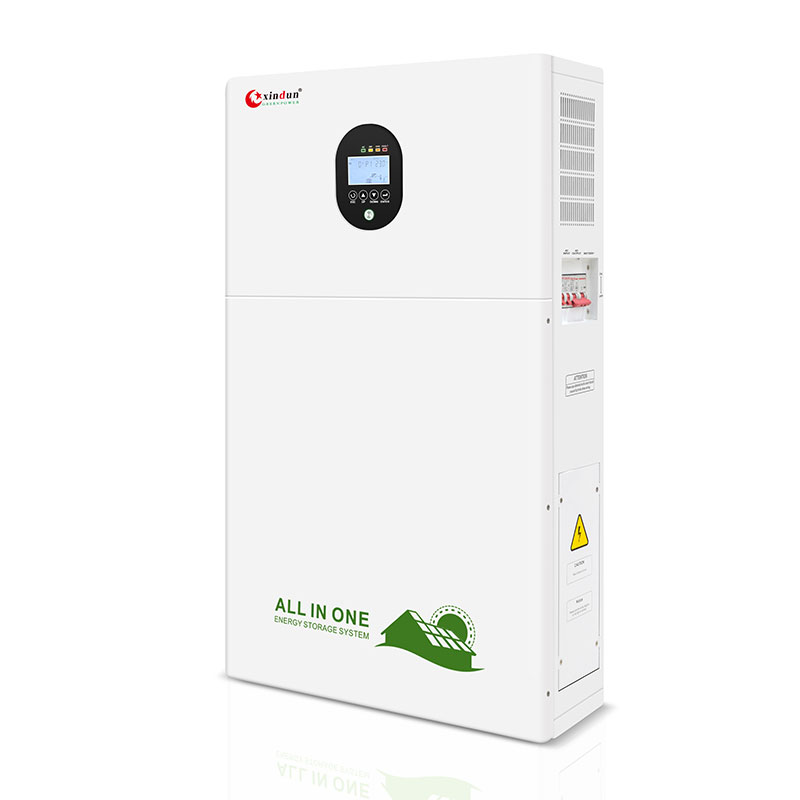
 3 Phase Inverter
3 Phase Inverter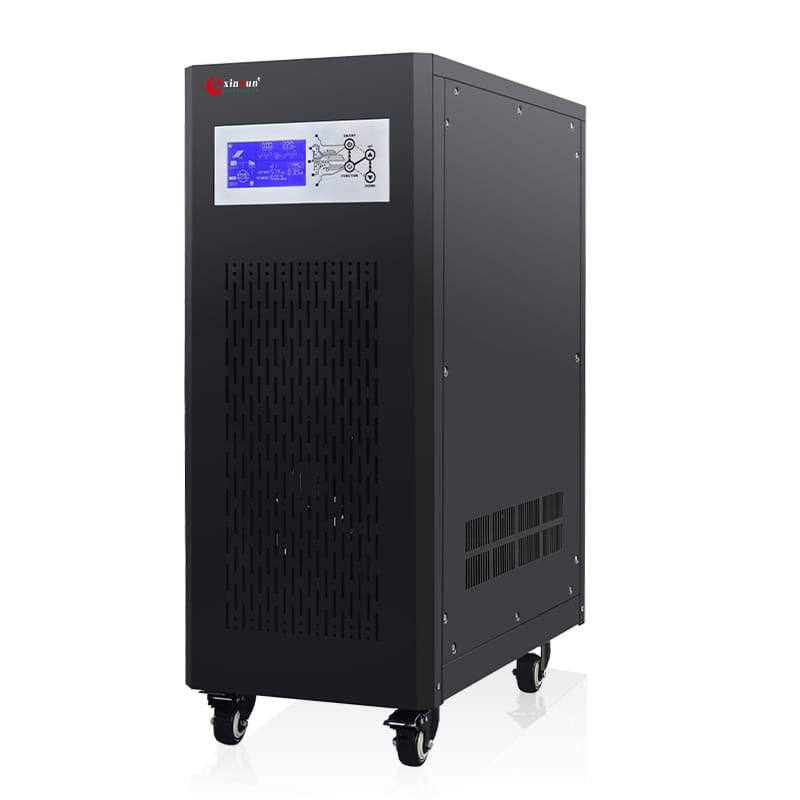
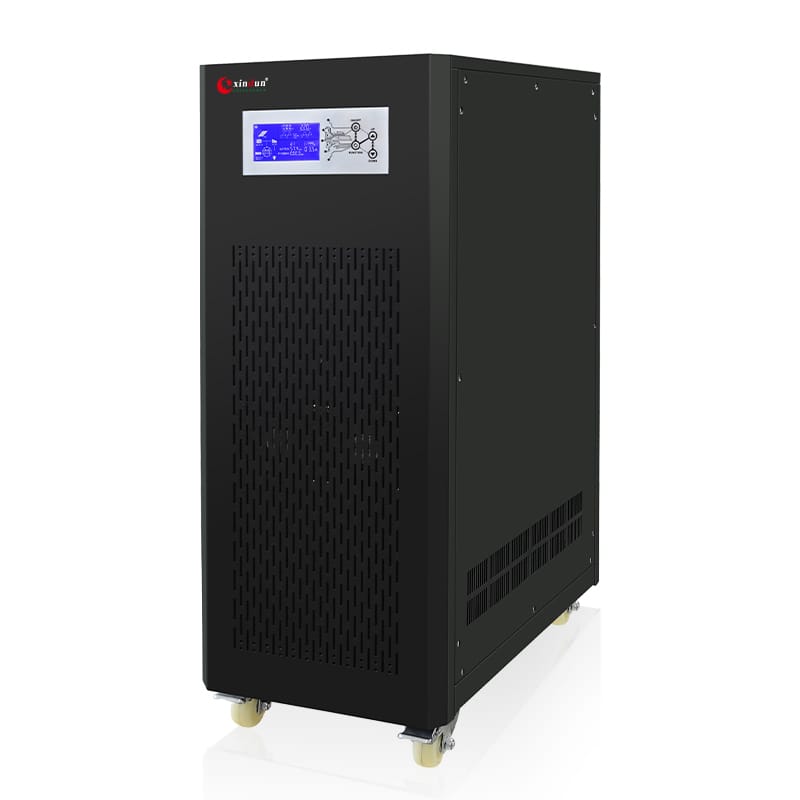
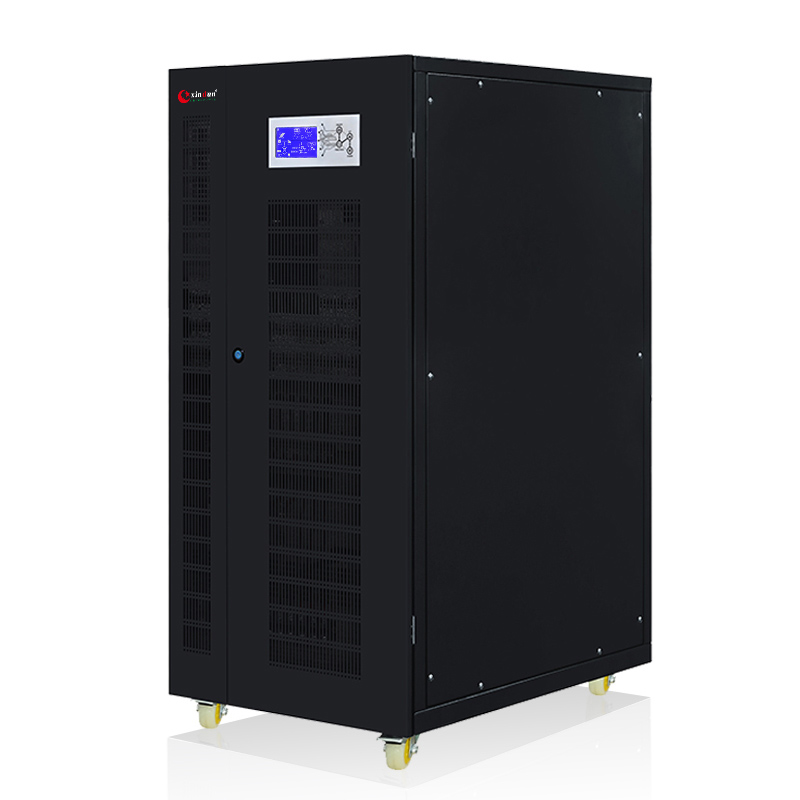
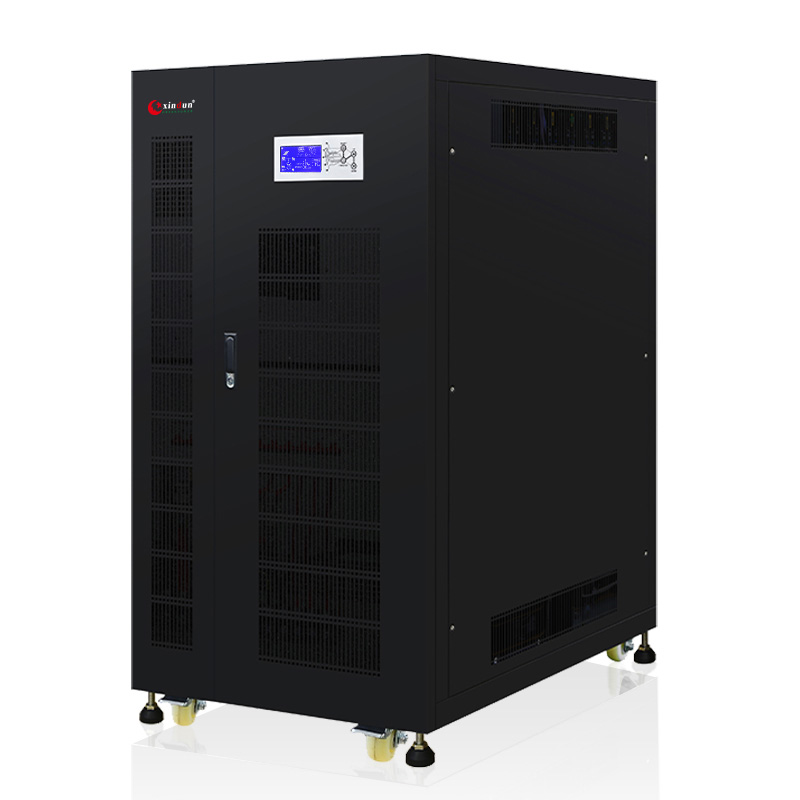
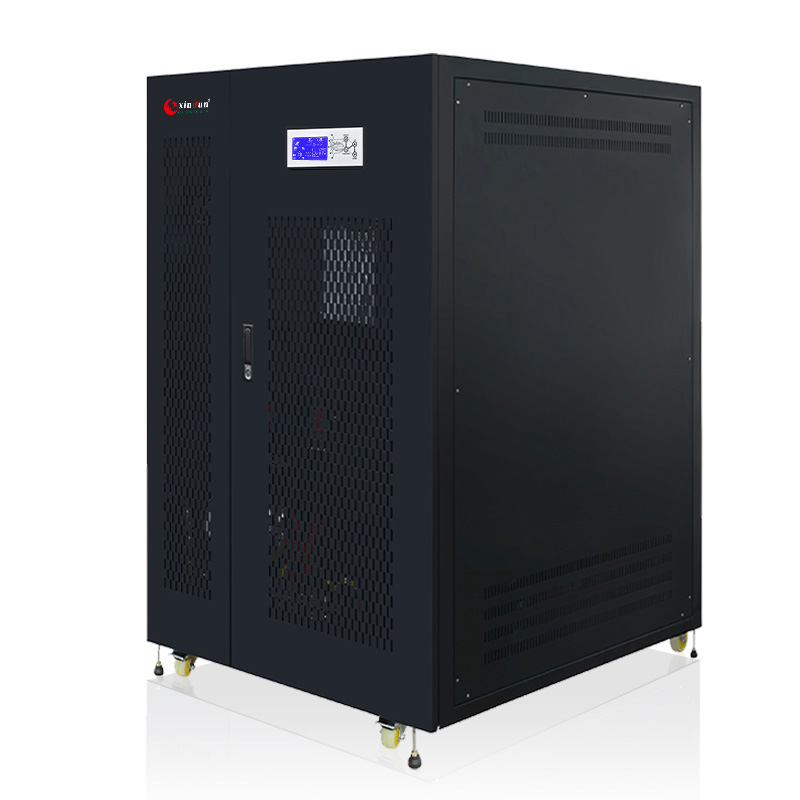
 Solar System Kits
Solar System Kits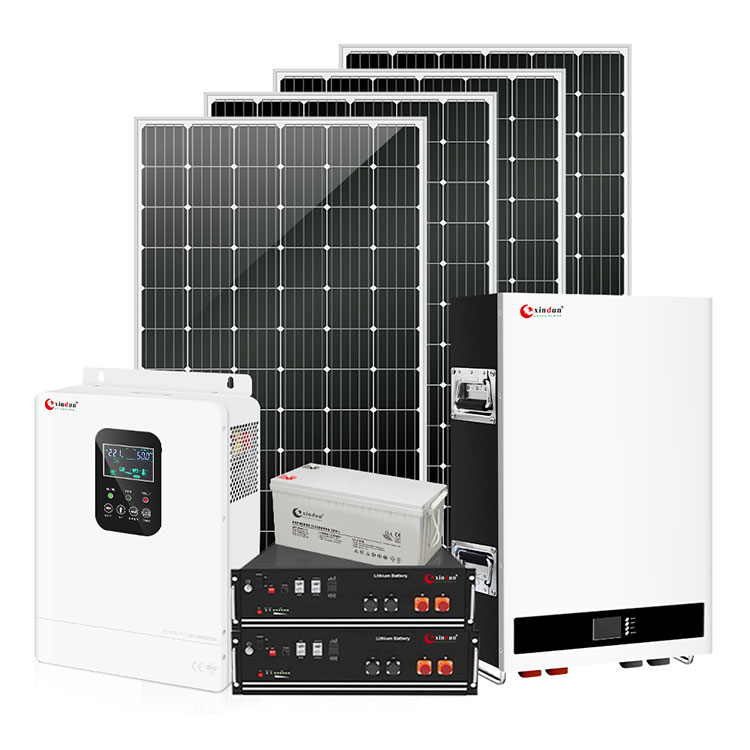
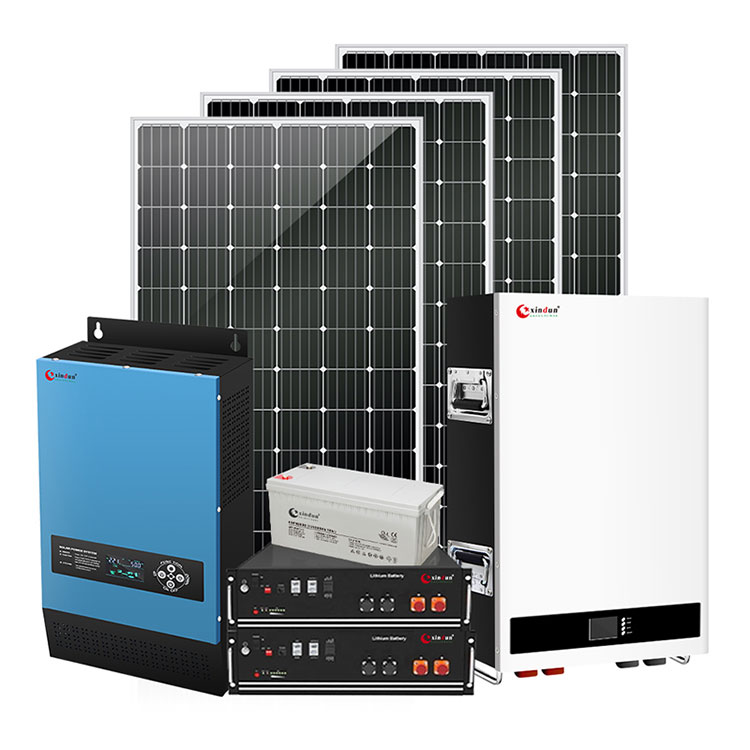
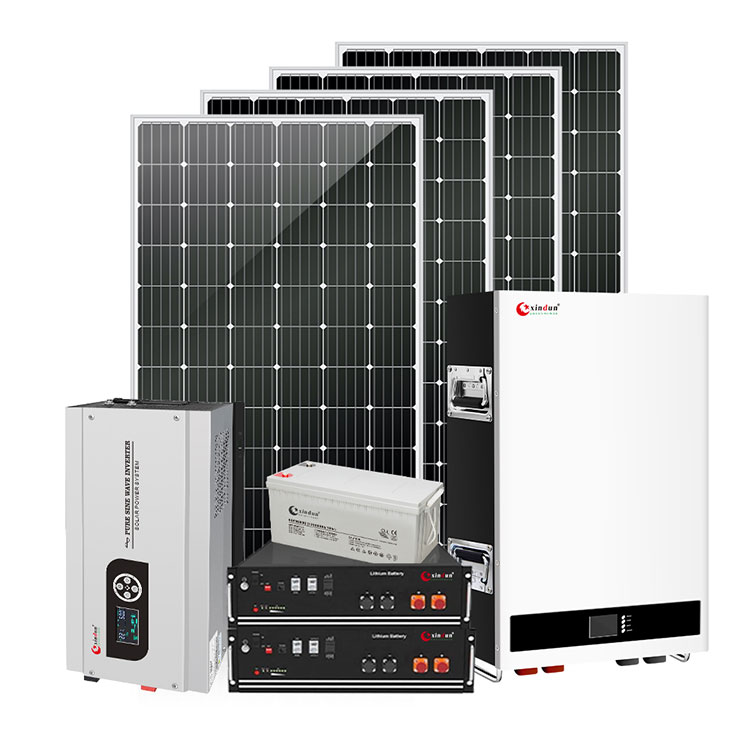
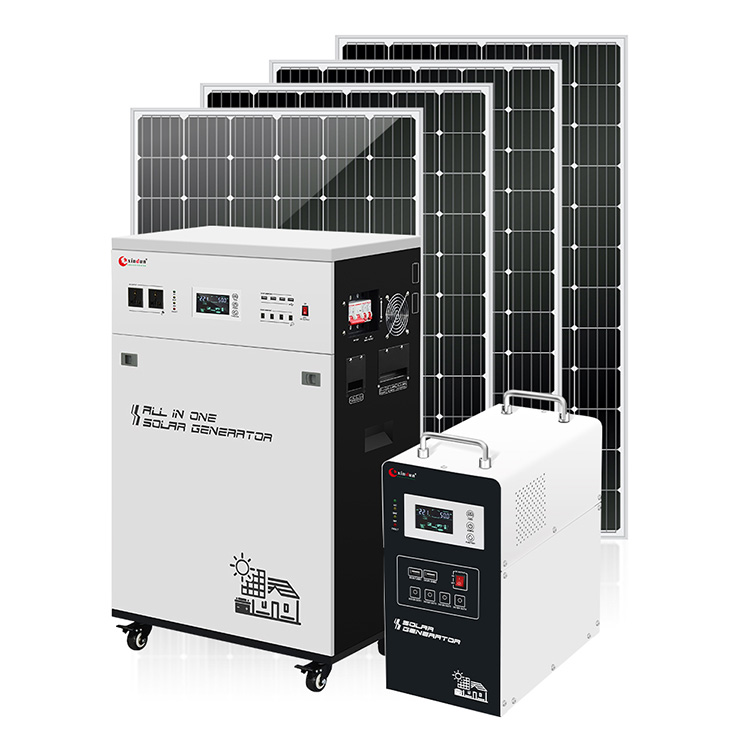
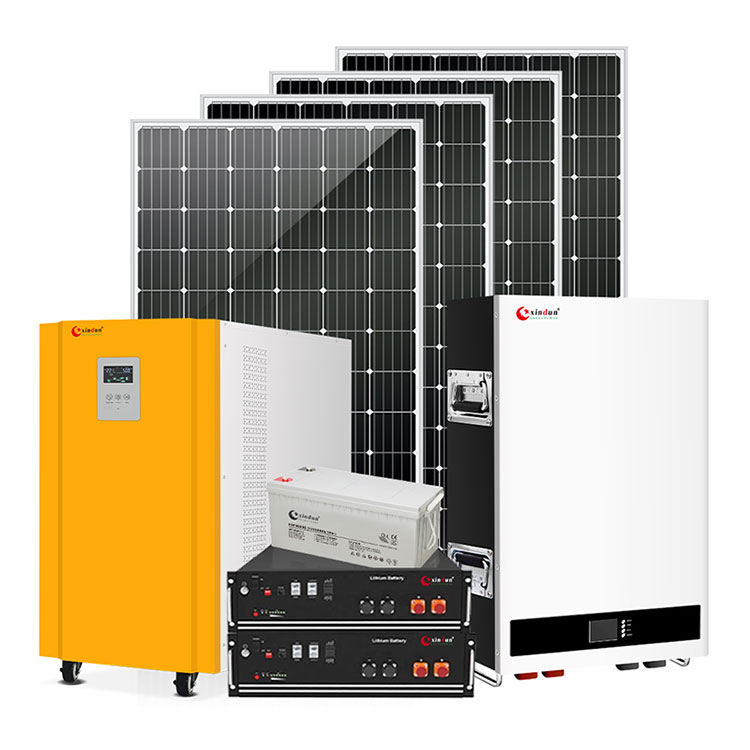
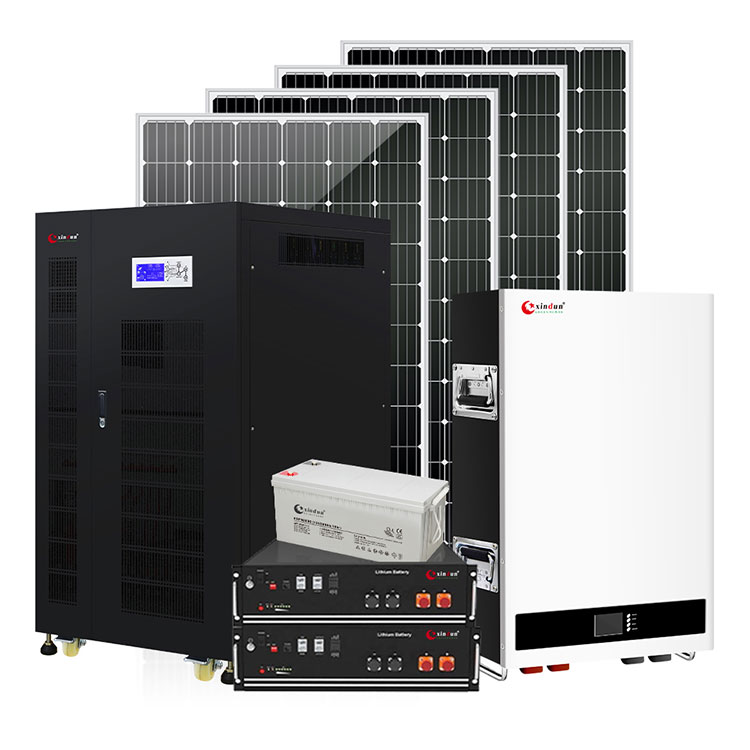
 Solar Charge Controller
Solar Charge Controller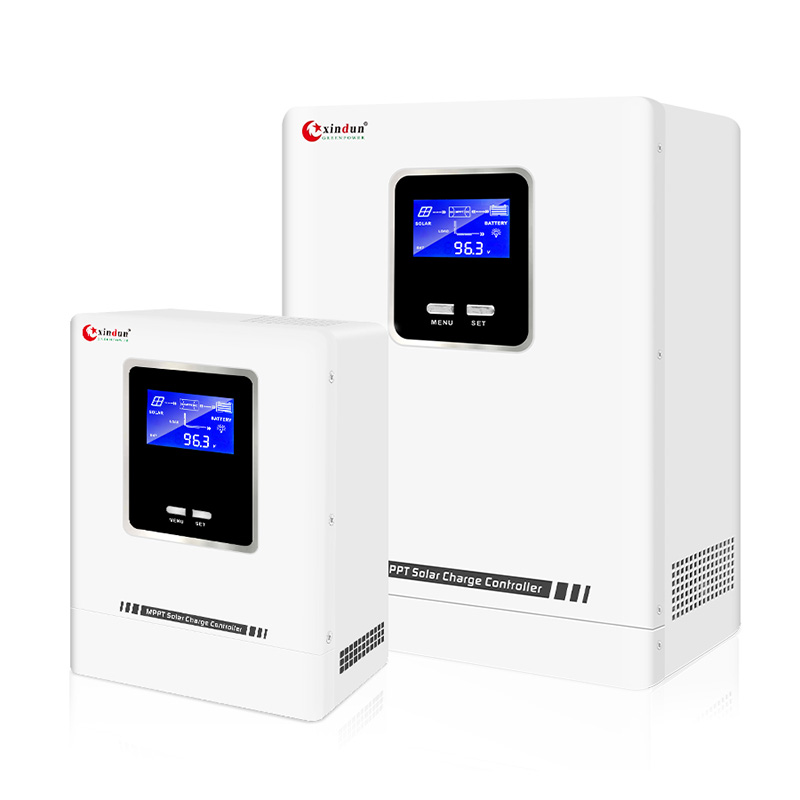
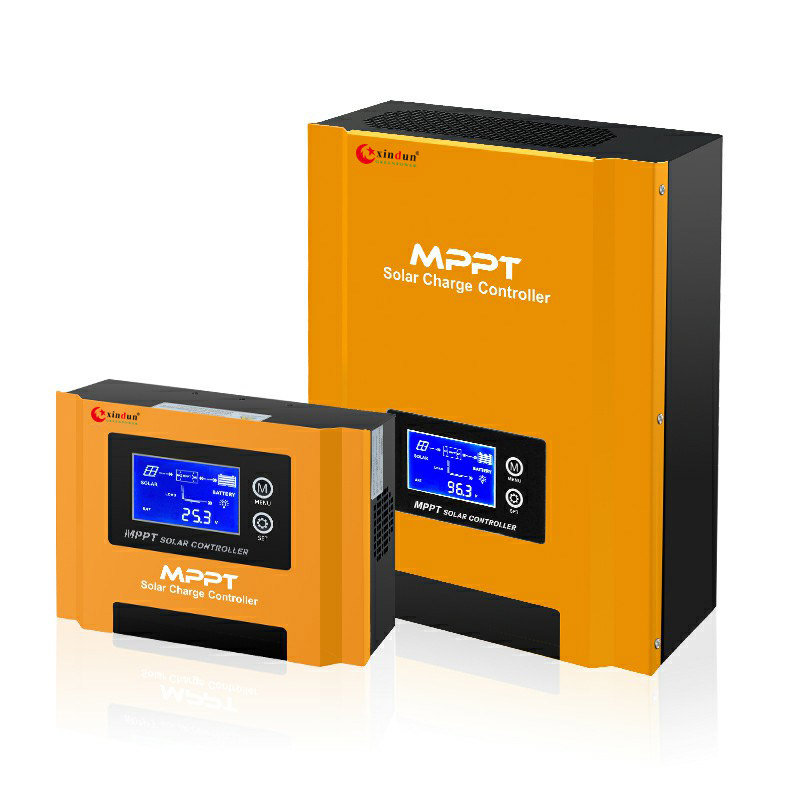

 Solar Battery
Solar Battery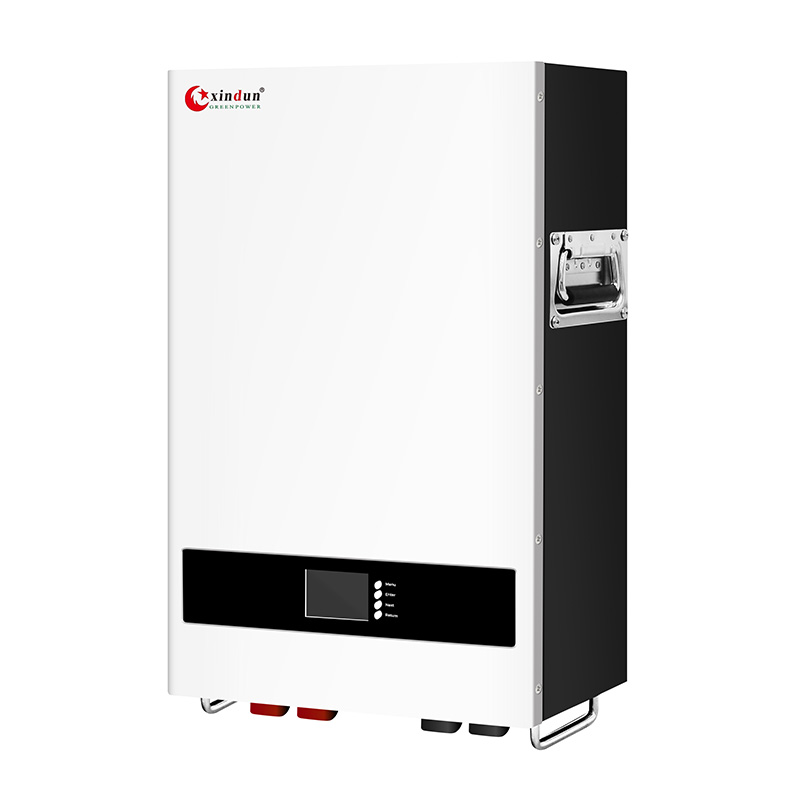
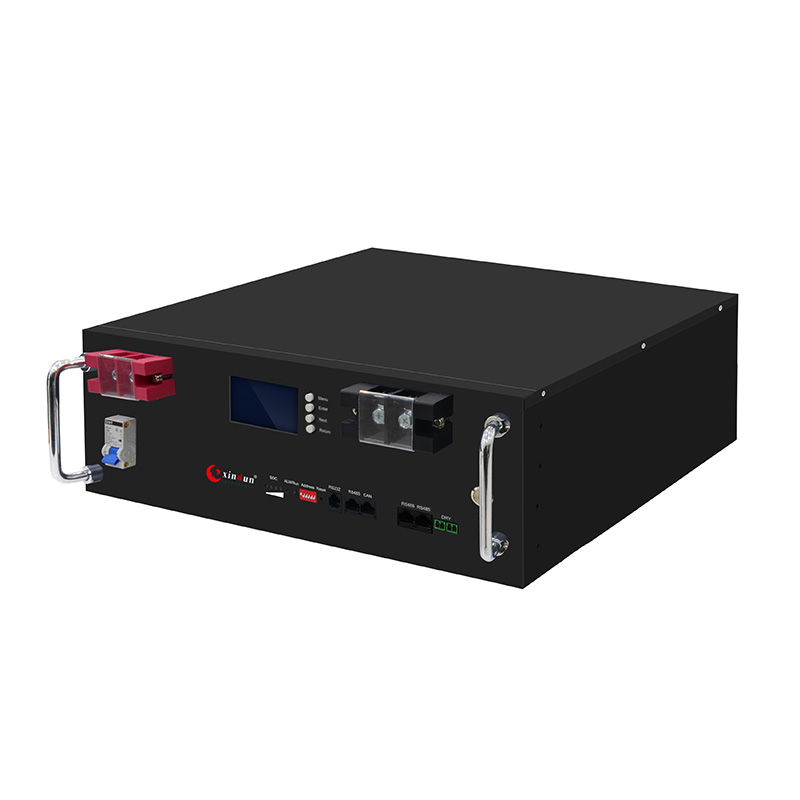
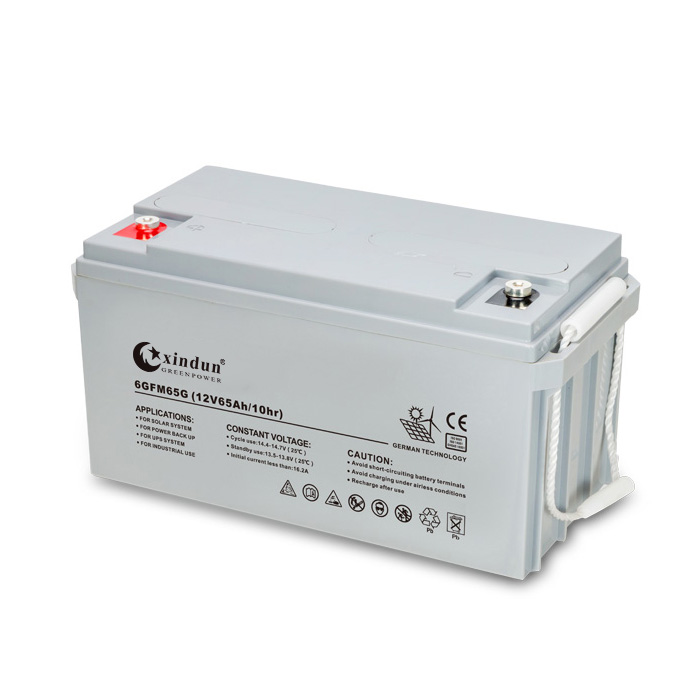
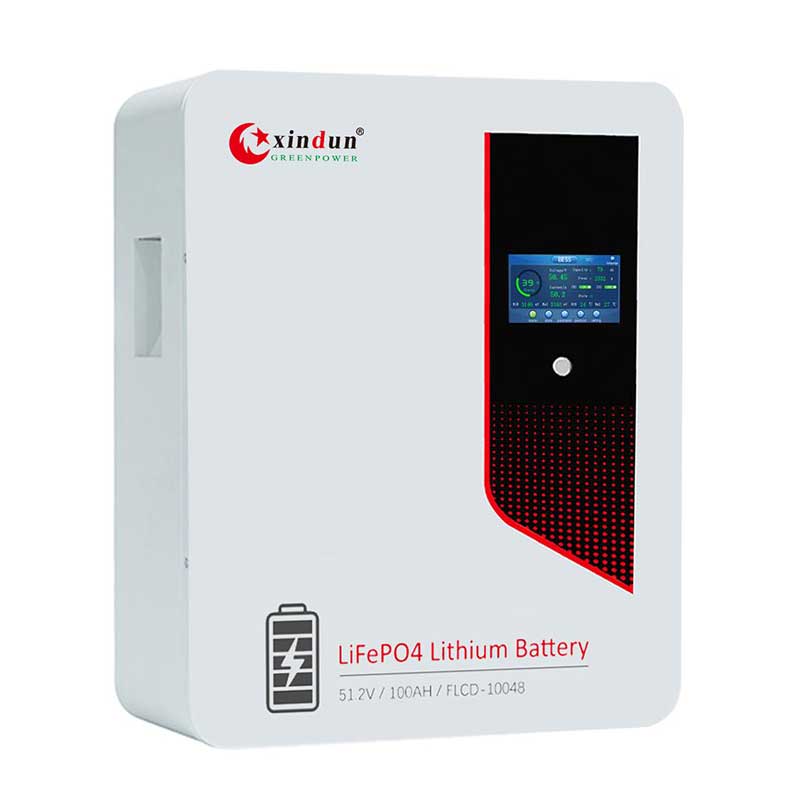
 Asia
Asia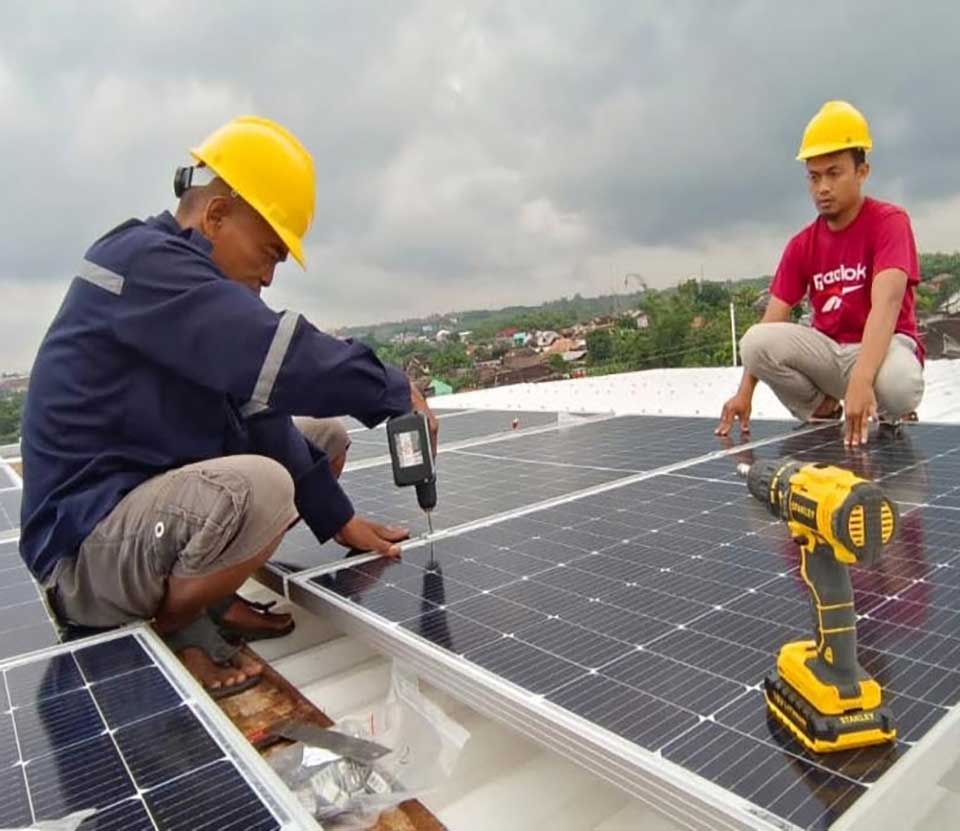
 Africa
Africa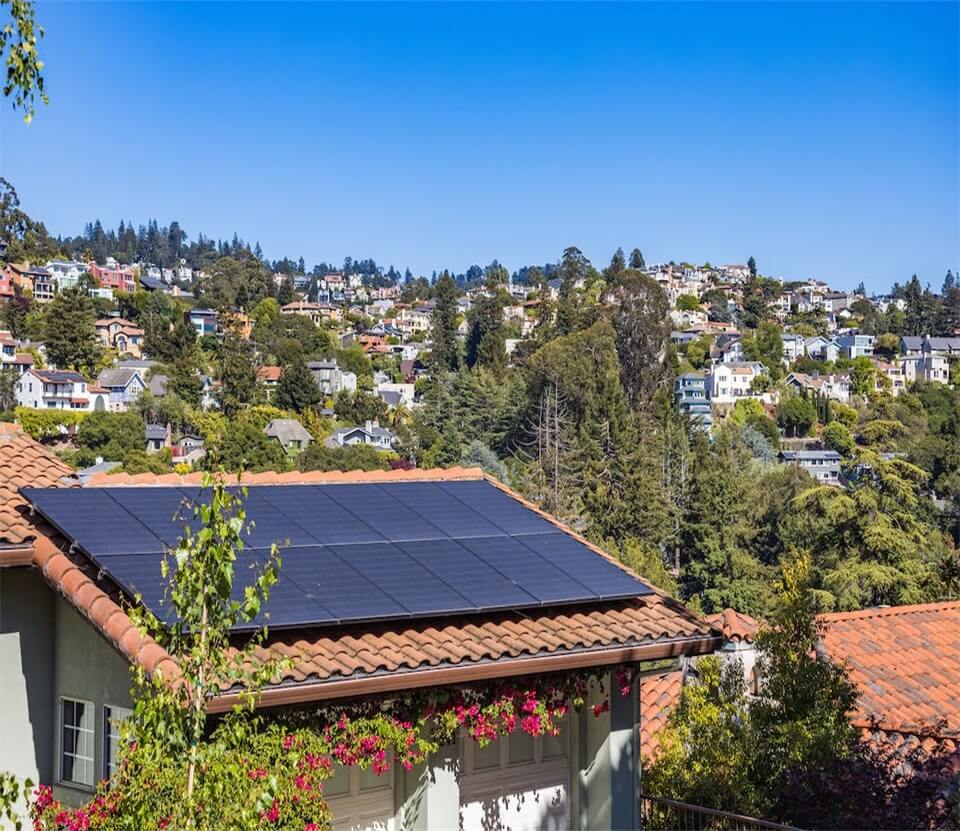
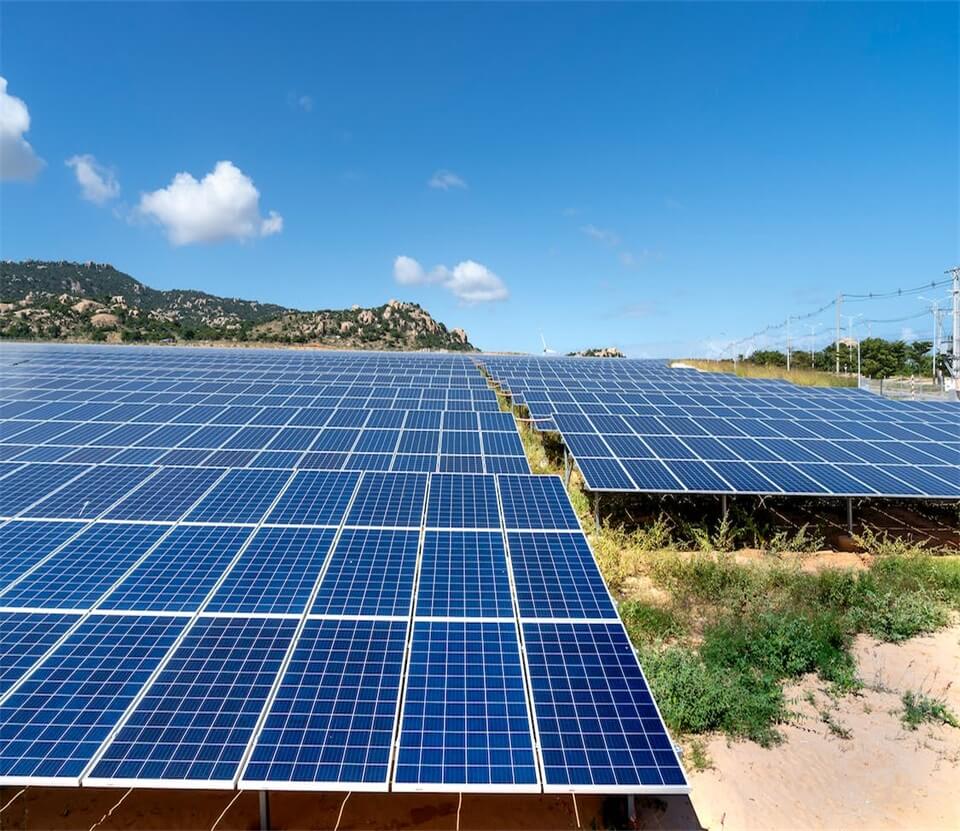

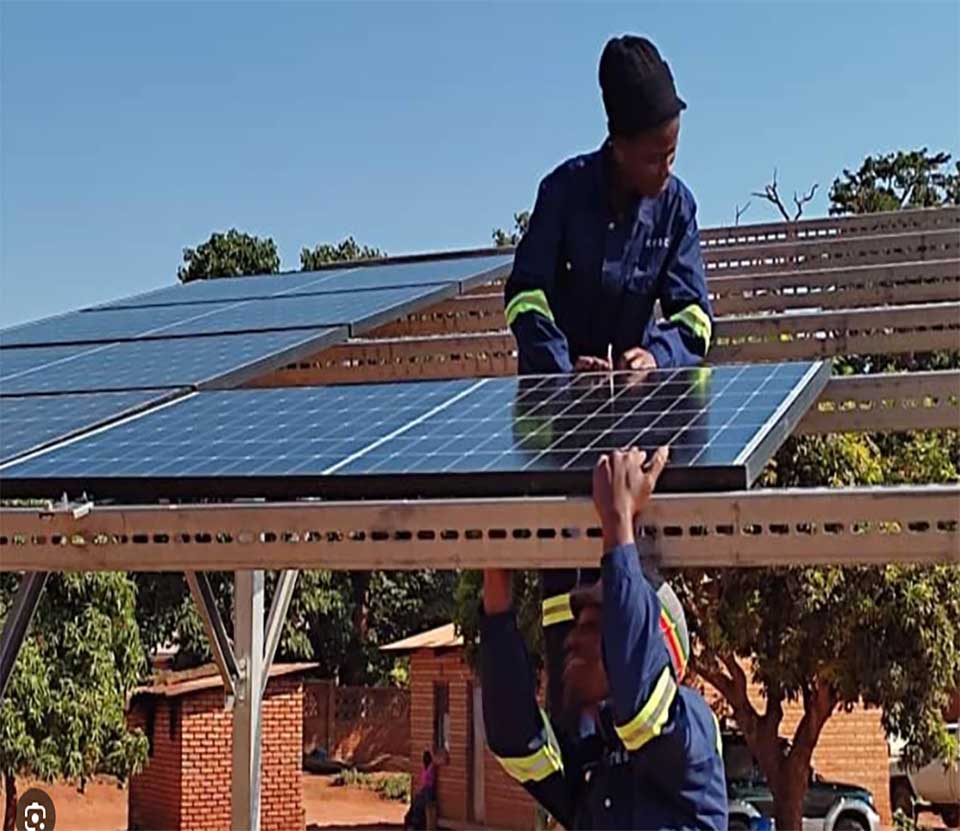
 South America
South America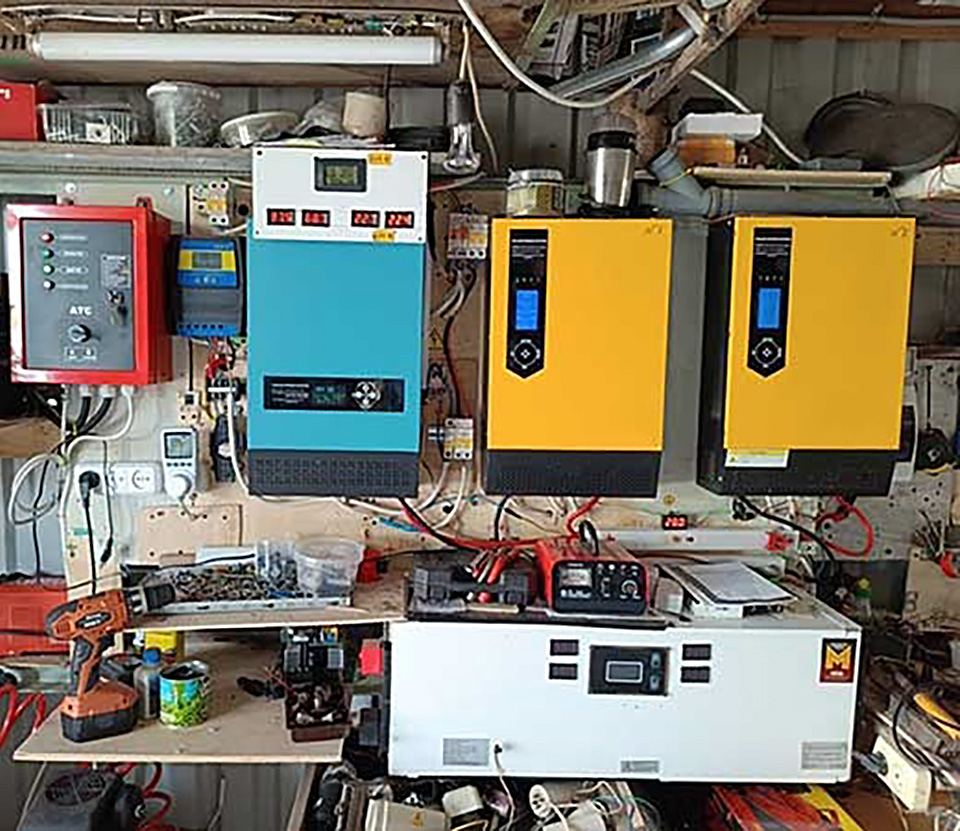
 Europe
Europe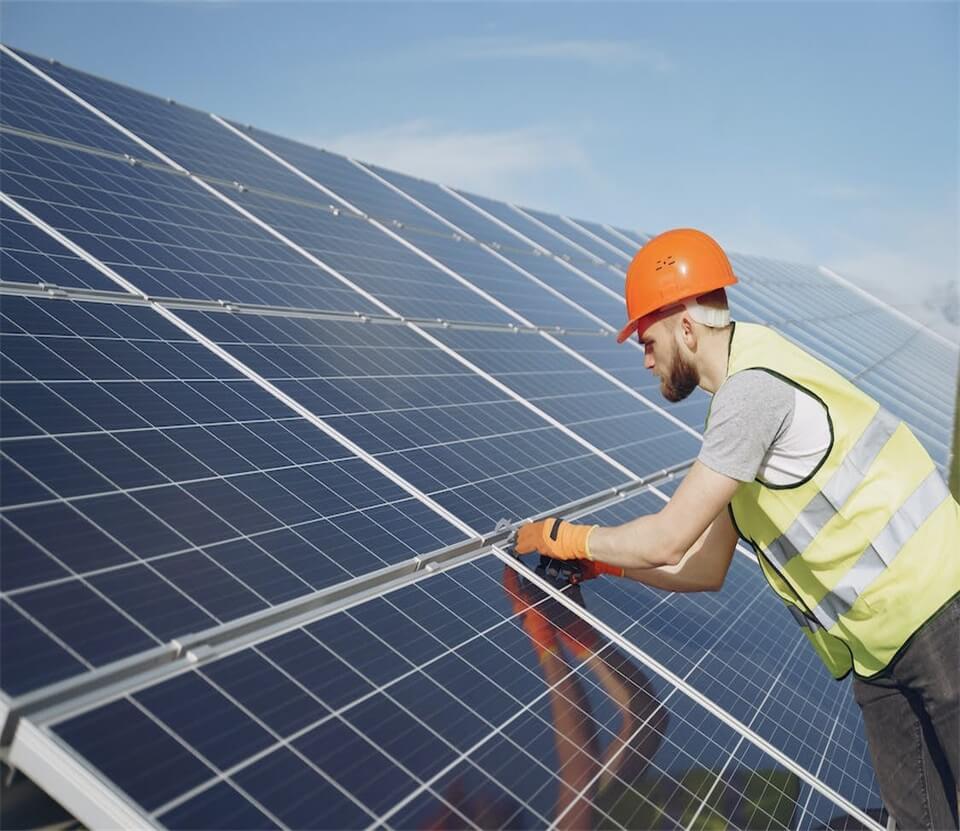
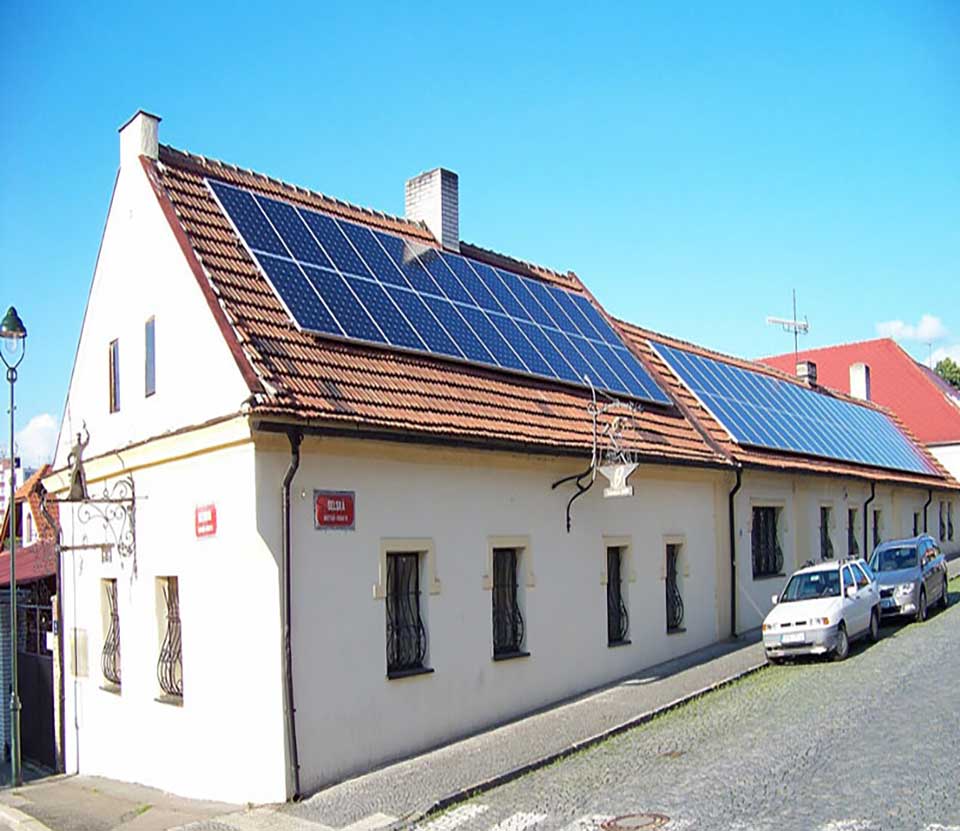
 North America
North America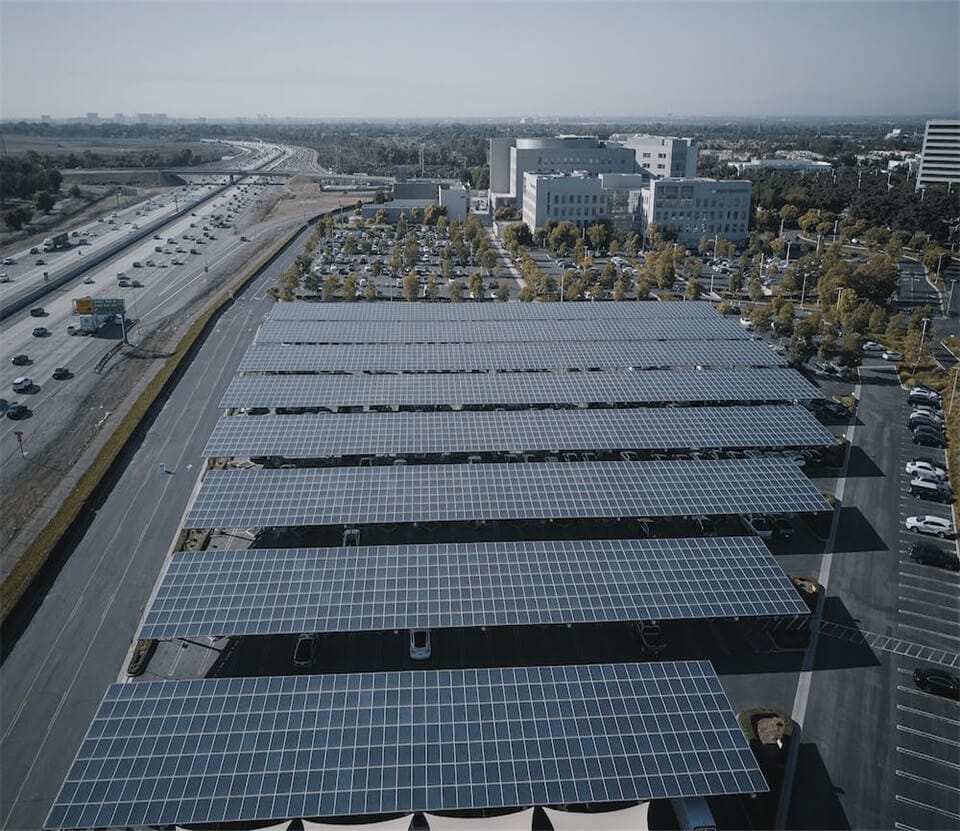
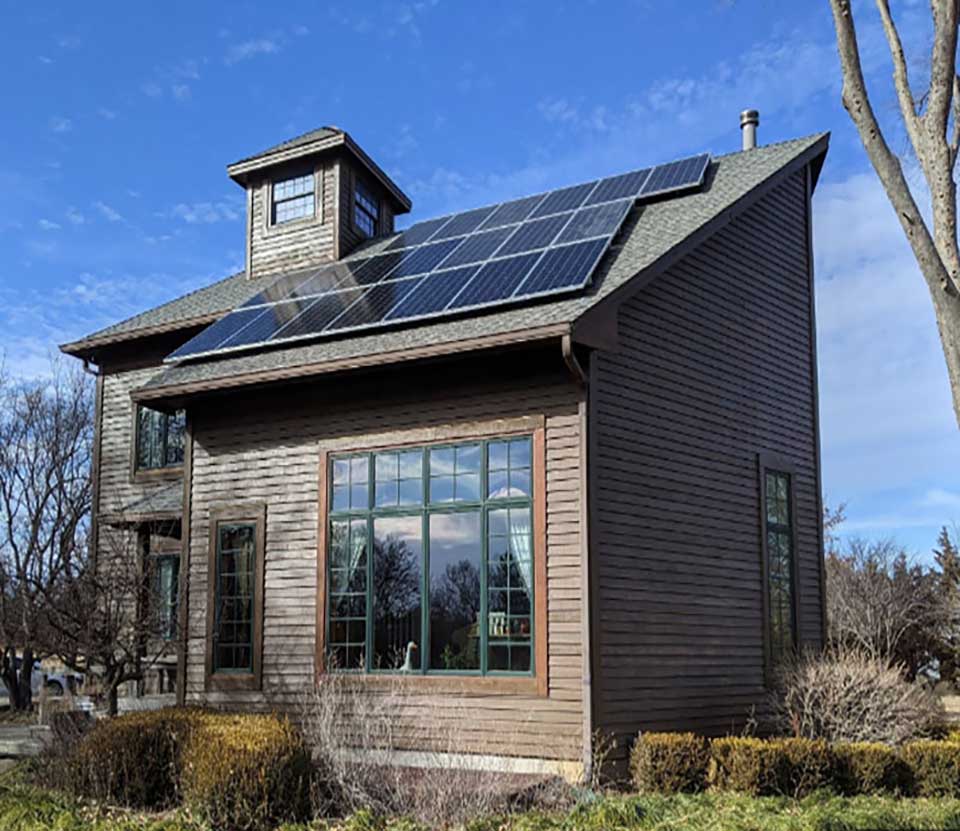
 Oceania & Antarctica
Oceania & Antarctica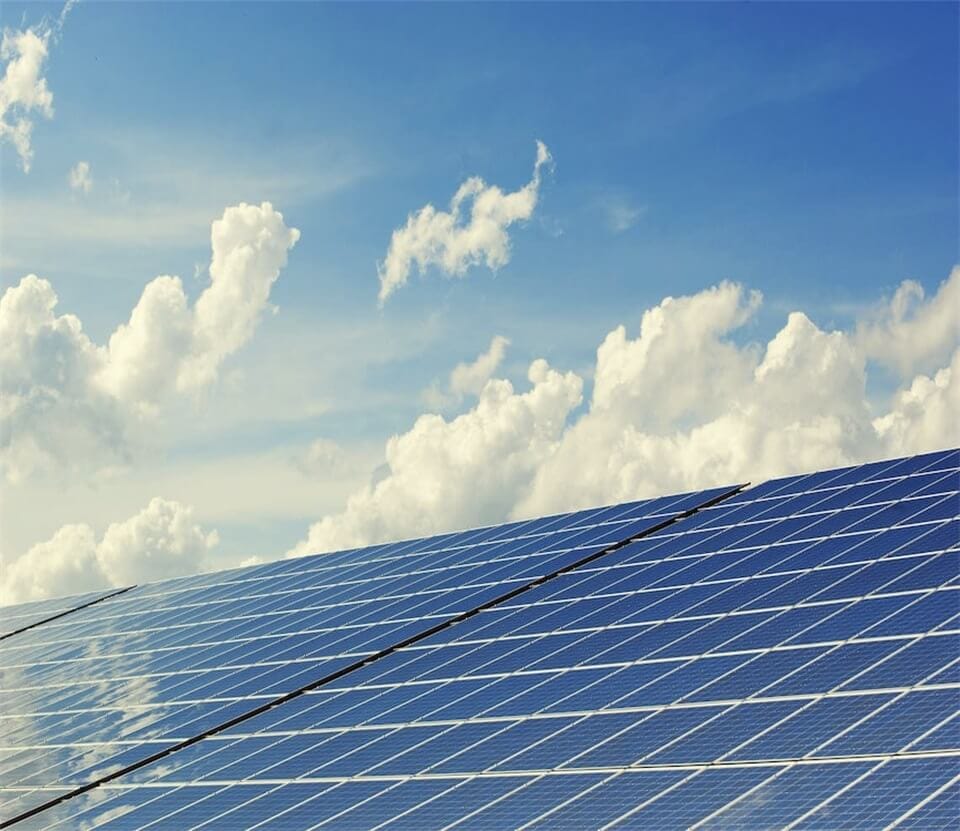










 Home
Home Solar Inverter Market Development Trends In Brazil
Solar Inverter Market Development Trends In Brazil  Top Selling Products
Top Selling Products














